Your parents can apply for a visitor visa if they wish to visit you while you are studying in Australia. It is important that they meet the requirements of the visitor visa. Visit NIEC, one of the best consultancy in Nepal for study in Australia.
Are you searching for the best consultancy in Nepal for Australia to help you with study visa, PR, or immigration services? Choosing the right Australia consultancy can be life-changing.NIEC is most trusted Australia visa consultants in Nepal, helping hundreds of Nepali students and professionals achieve their Australian dream with a high visa success rate.

For many Nepali students in Nepal, studying in Australia is a lifelong pursuit. NIEC is the best consultancy in nepal for Australia education, working diligently to provide service and support for all aspects of the Australian student visa process, university admission and scholarship opportunities. The team at NIEC provides tailored advice for students who wish to study at either the undergraduate/graduate level or the postgraduate level, matching each student with the best suited university and program to pursue their desired area of study. As the leading Australian education consultancy in Nepal for many years, NIEC has successfully assisted many students through the entire university application and visa process so each student will have a successful and pain-free transition into studying in Australia.
Australia is the world’s sixth largest country but one of the least densely populated countries. Its area is large with approximately 7.7 million square kilometers and its home to nearly 26 million people.
Australia represents many ethnic groups and is also known as one of the most culturally diverse countries. More than 200 languages are spoken in Australian households but, English is the official language of Australia.
Australia is an island continent with a wide variety of unique and distinctive flora and fauna. It is divided politically into six States and two territories: Australian Capital Territory (ACT) – Canberra, New South Wales (NSW) – Sydney, Northern Territory (NT) – Darwin, Queensland (Qld) – Brisbane, South Australia (SA) – Adelaide, Tasmania (Tas) – Hobart, Victoria (Vic) – Melbourne and Western Australia (WA) – Perth. Overall, Australia has a relatively warm climate where summers tend to be hotter and more humid in the north and winters usually are colder in the south.
Trusted and experienced Australia study consultants in Nepal
Personalized counselling for top Australian universities
Complete assistance with Australia student visa processing in Nepal
Guidance on IELTS, GTE, and scholarship requirements
End-to-end support for living and studying in Australia
Explore inspiring student stories that highlight the real-world impact of our programs on their lives and future careers.
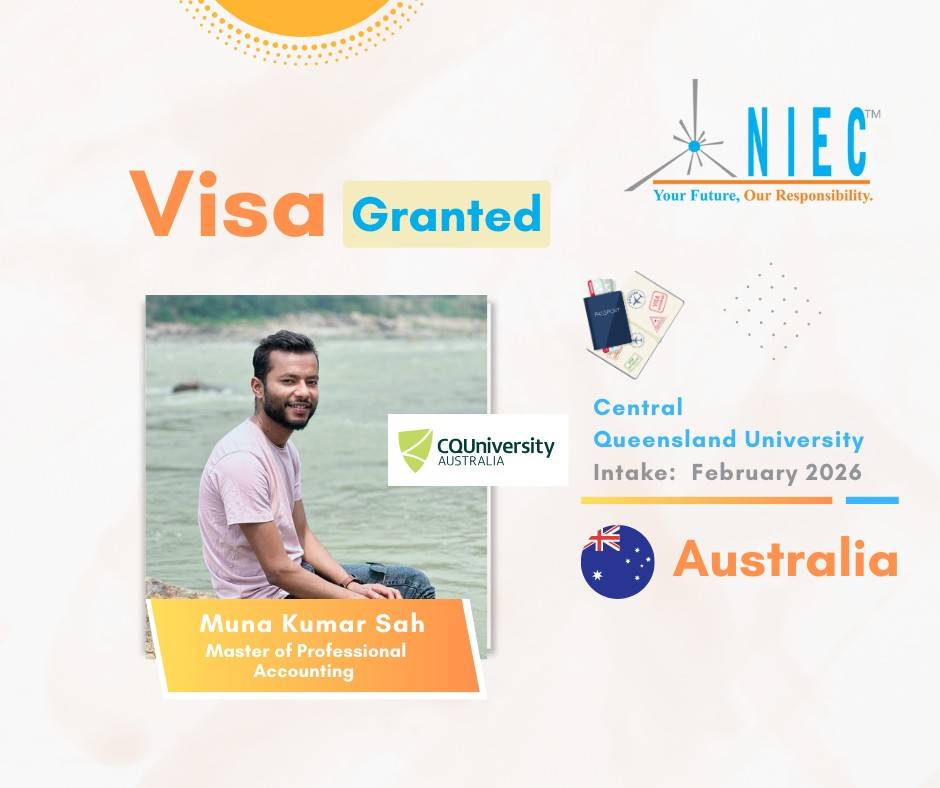
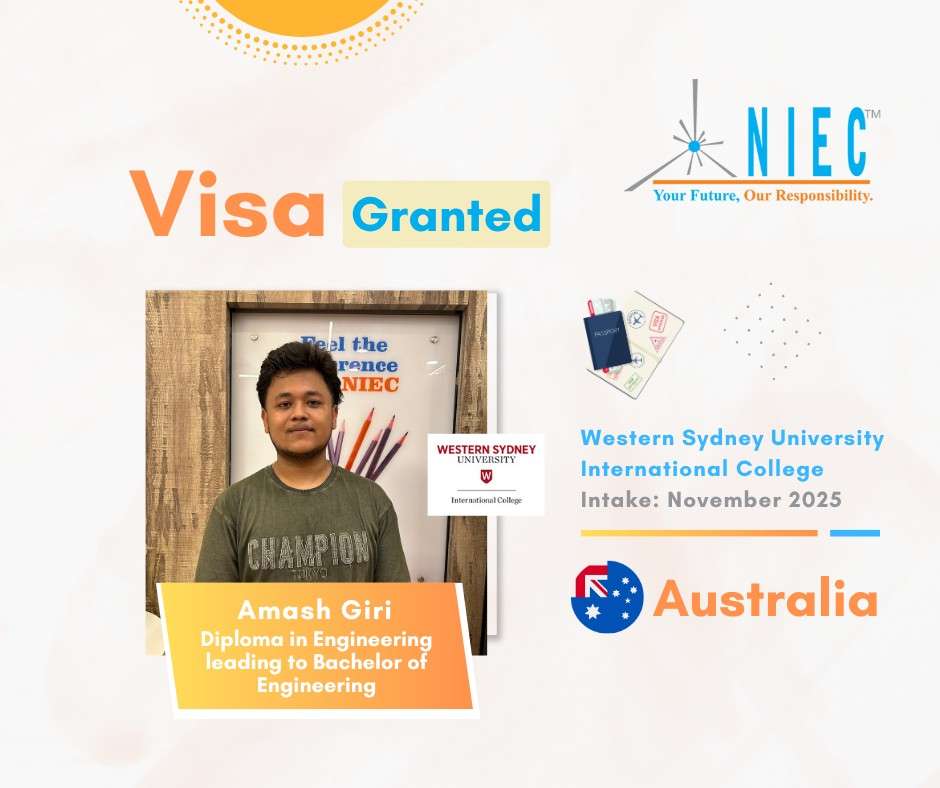

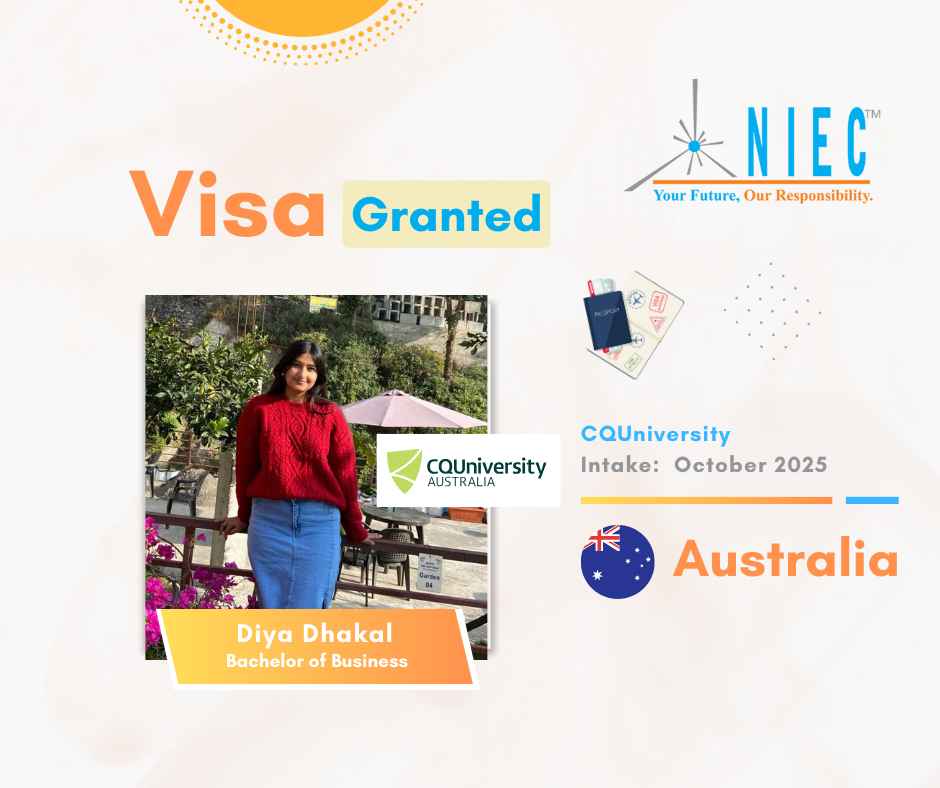
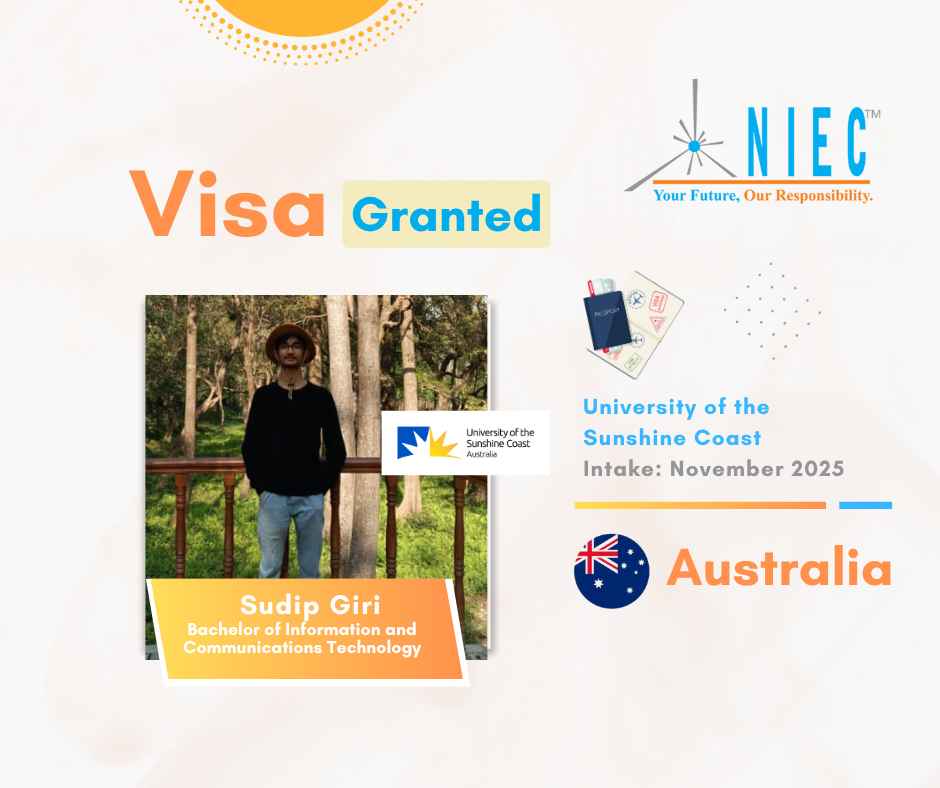
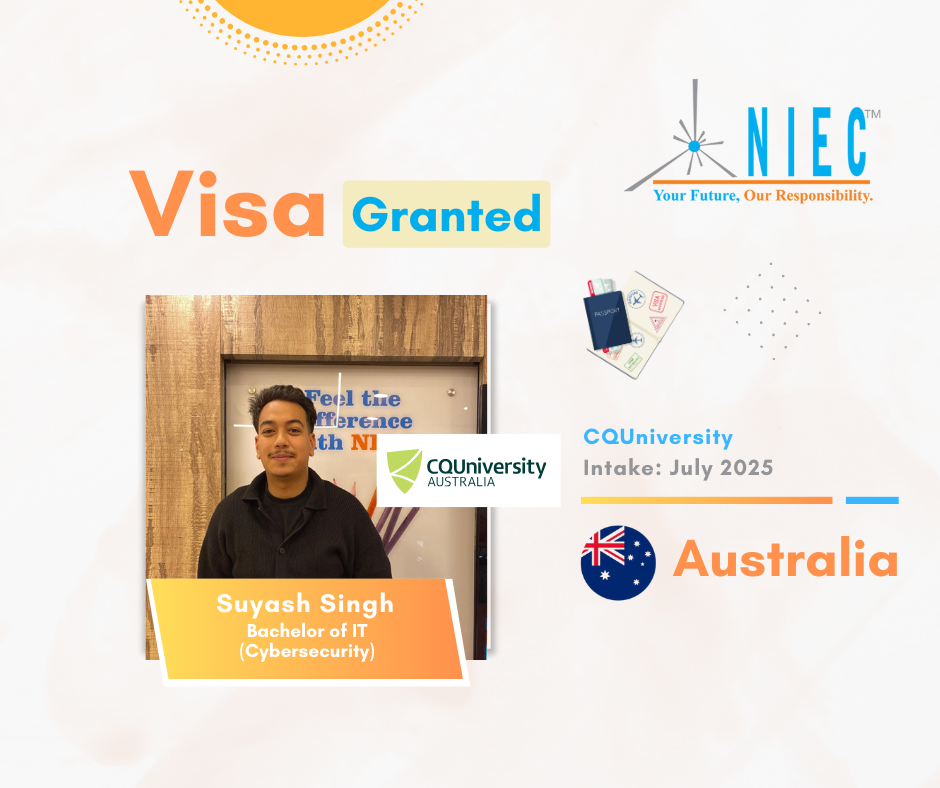
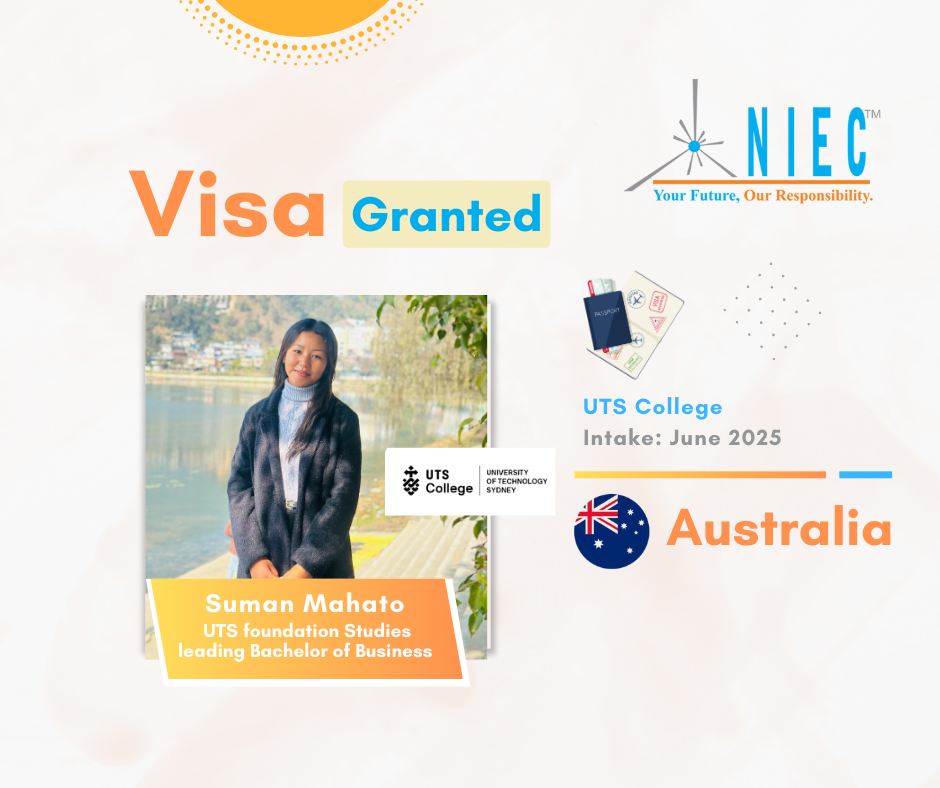
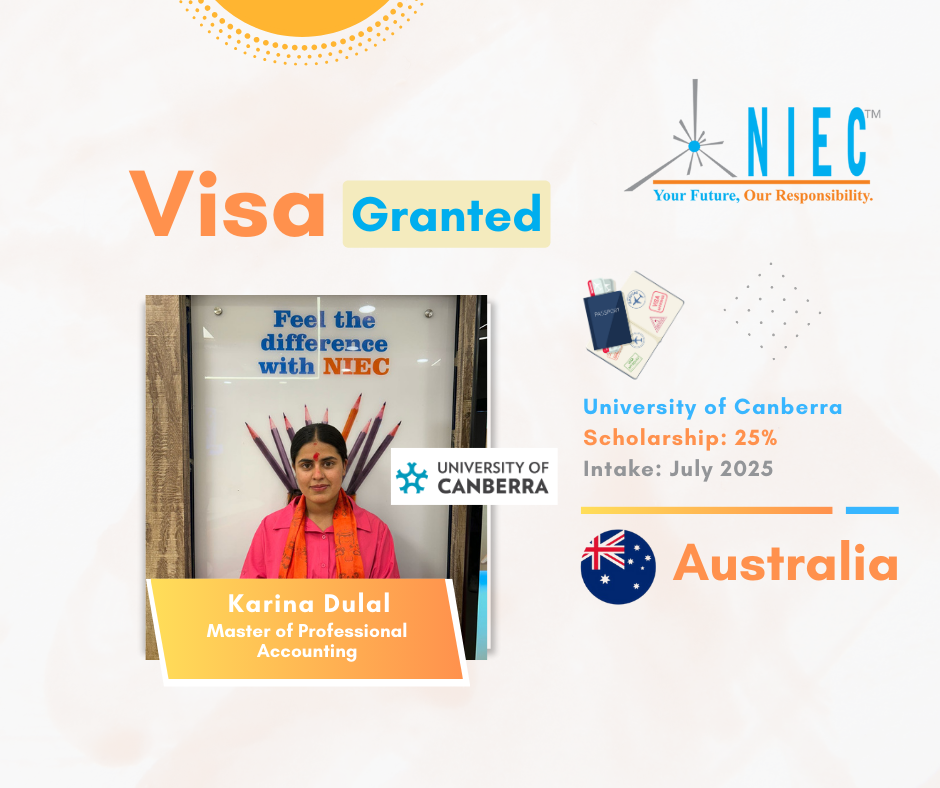
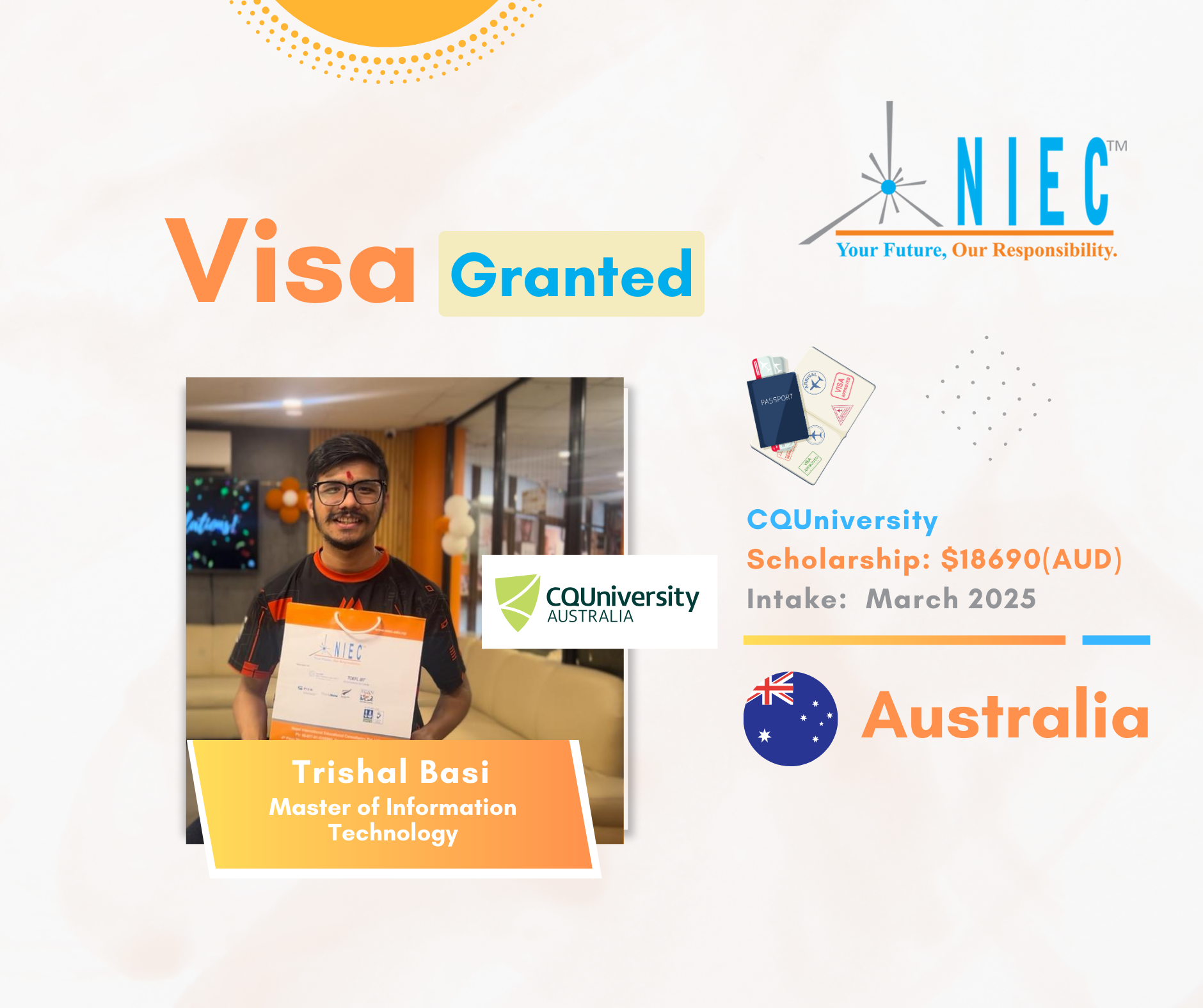
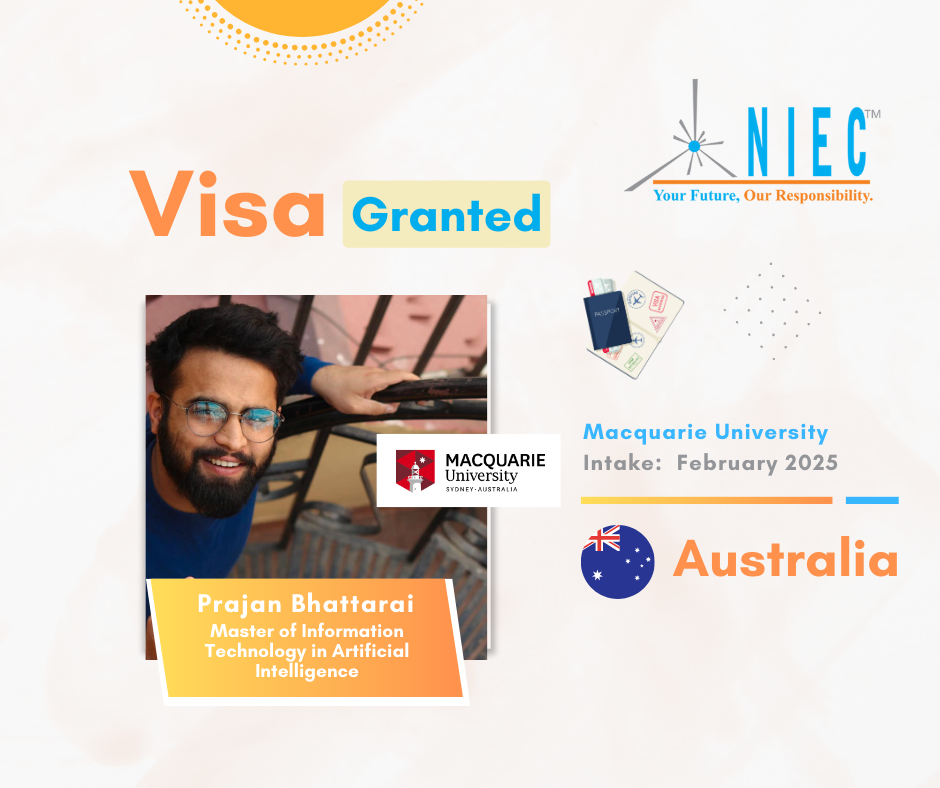
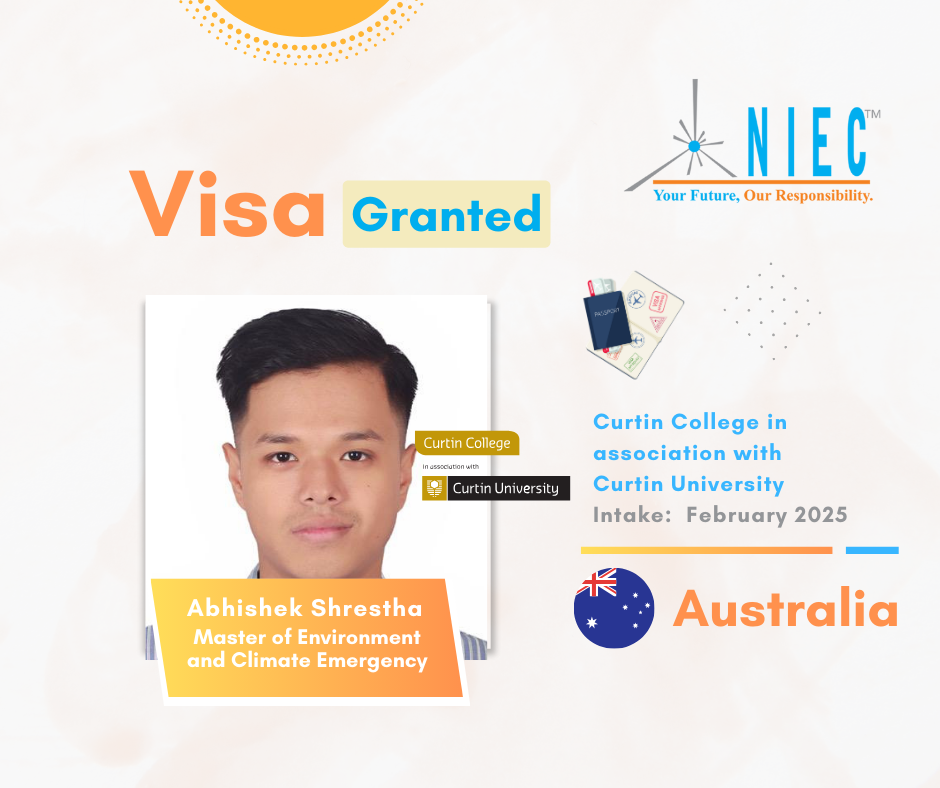
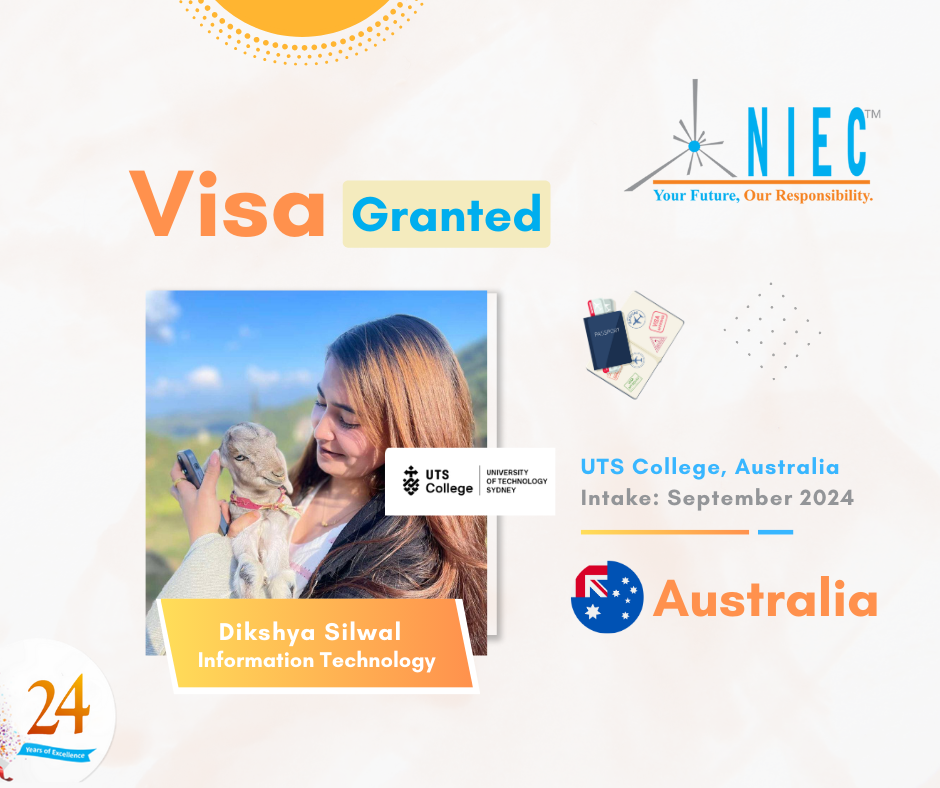
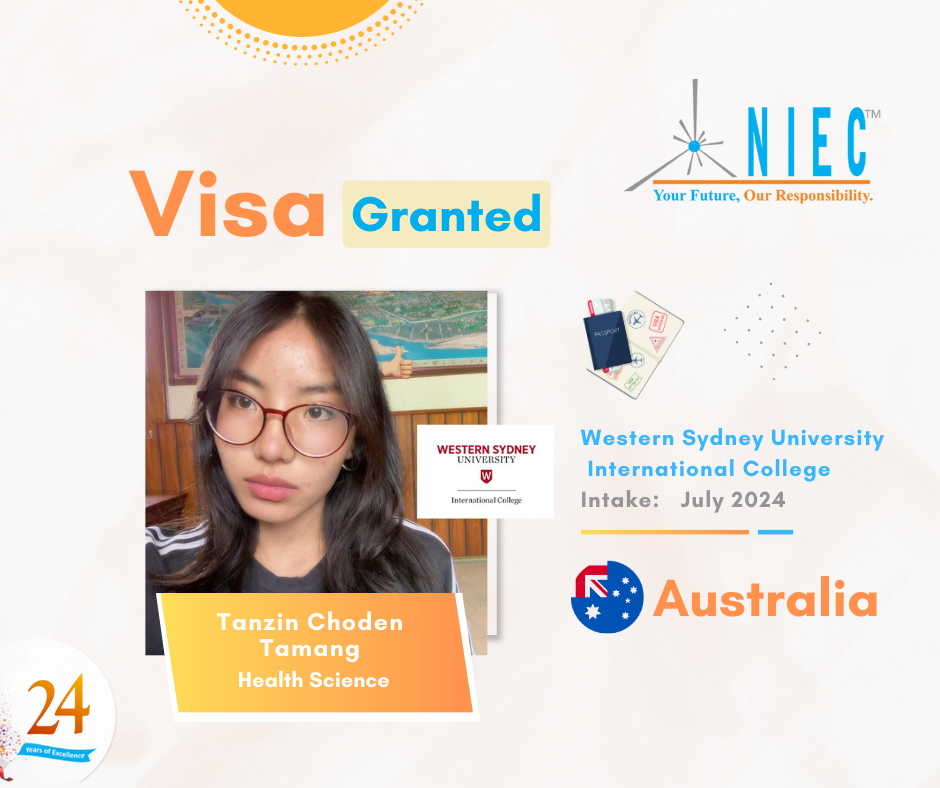
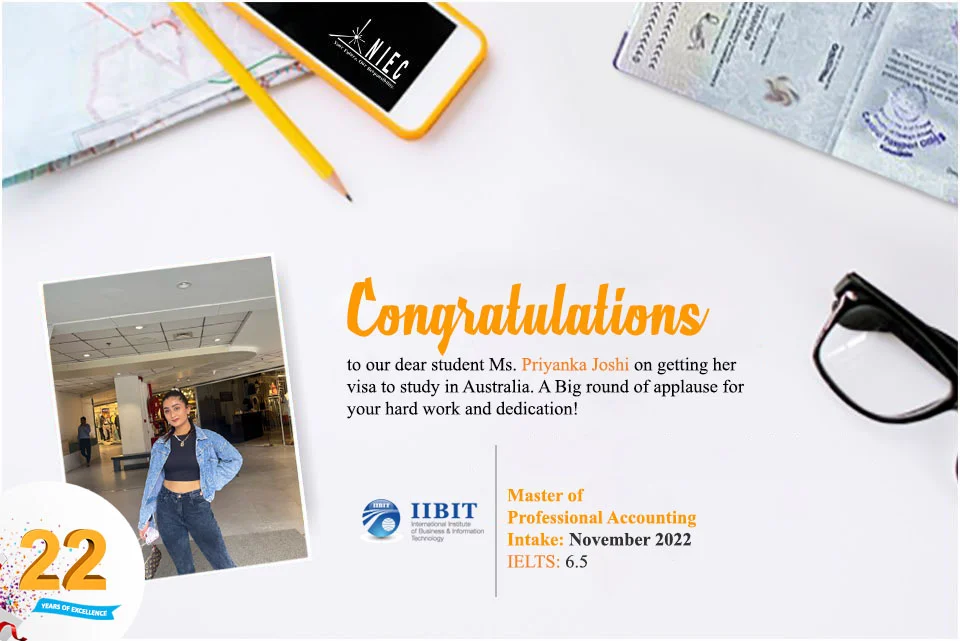
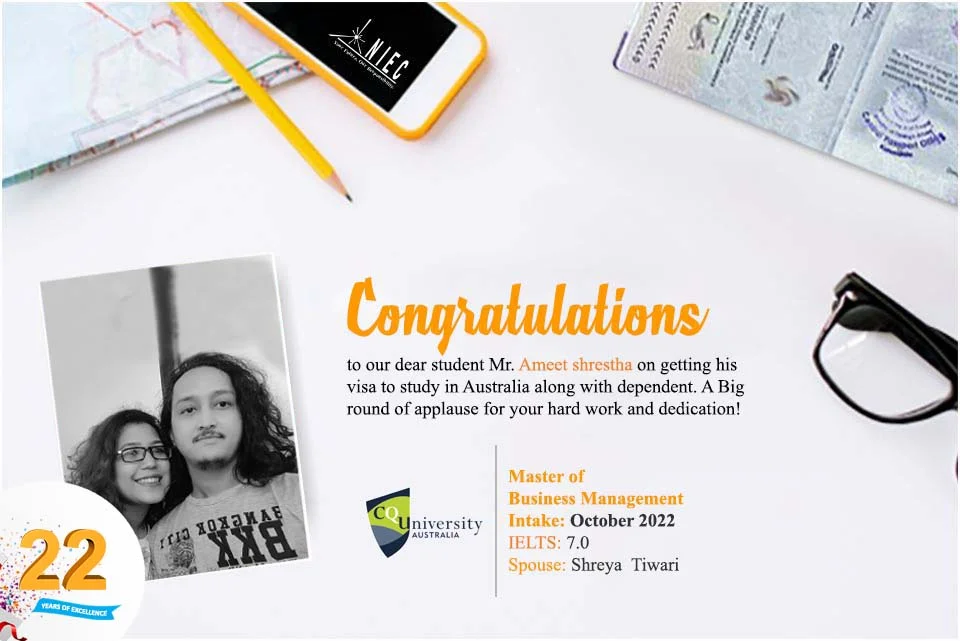
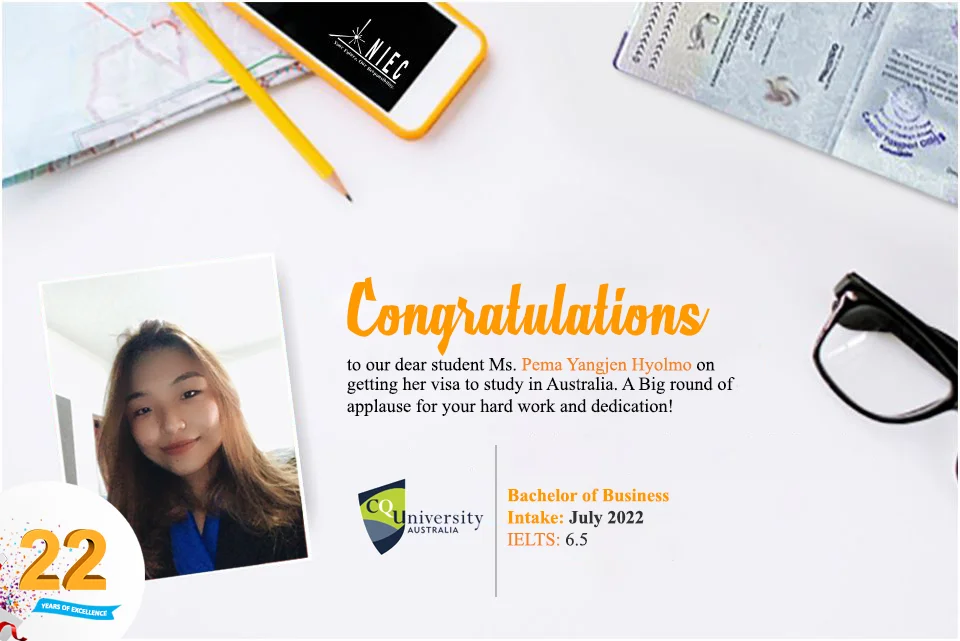
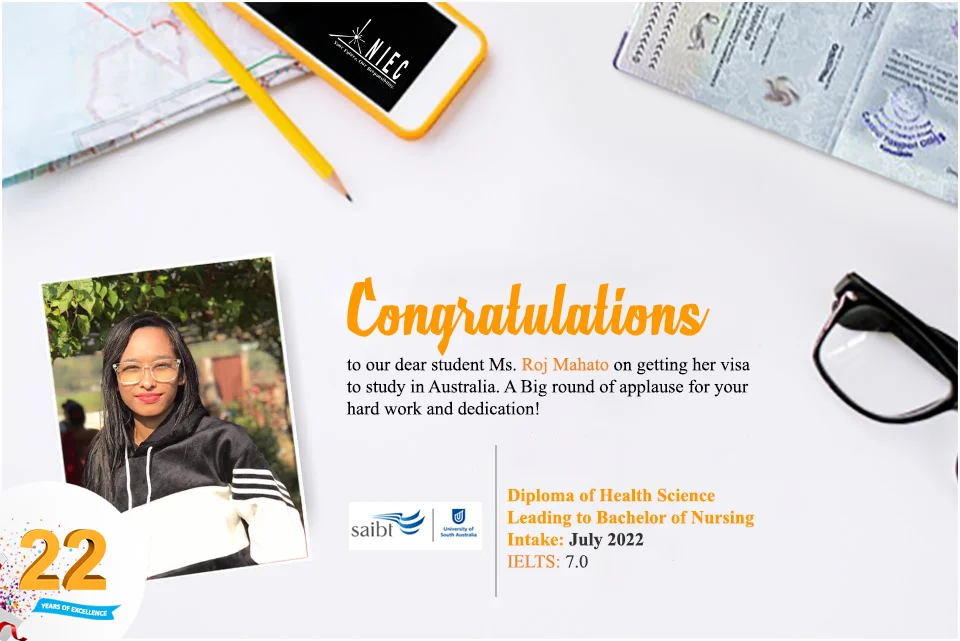
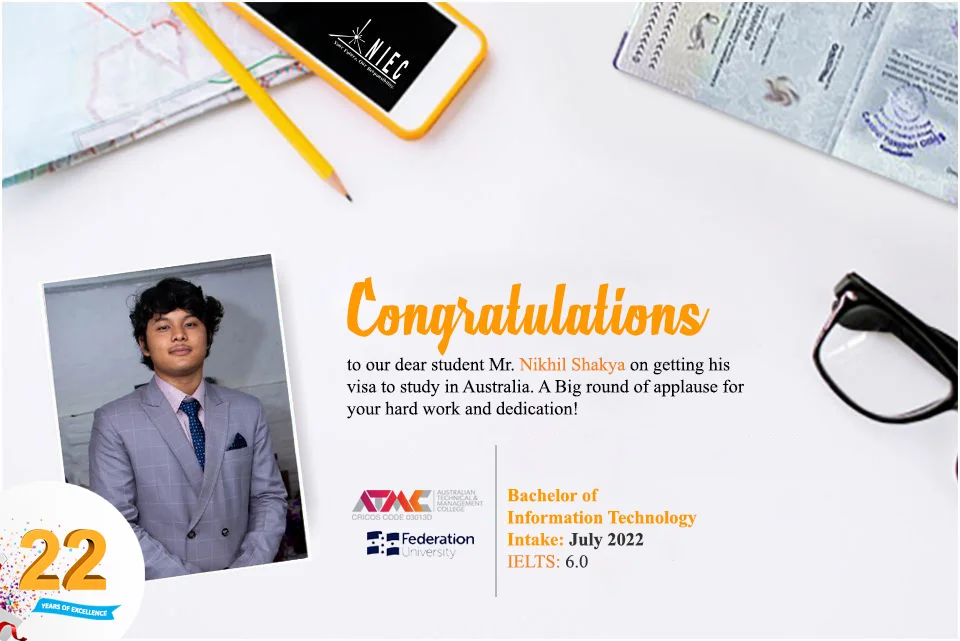
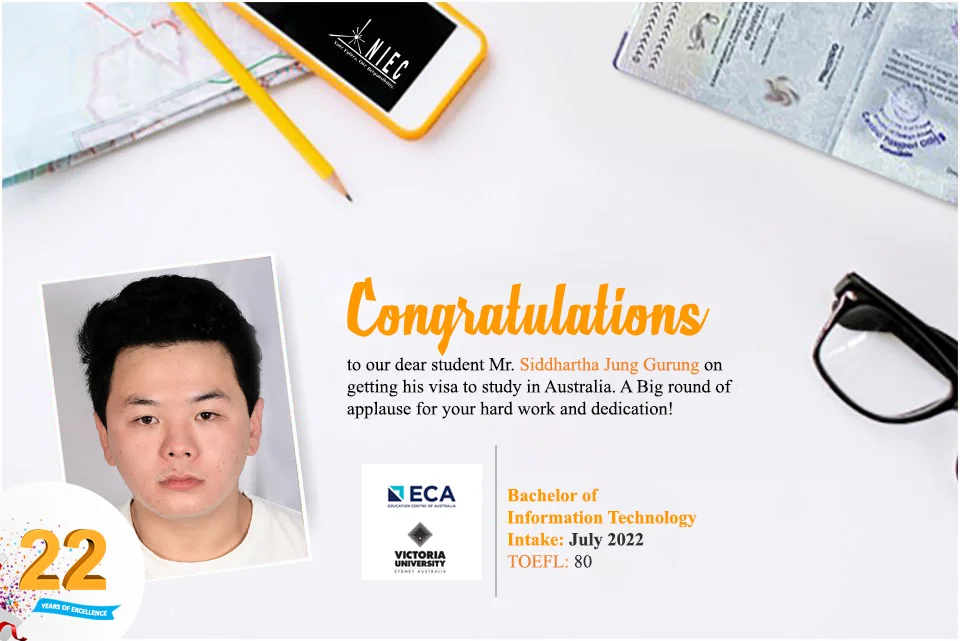
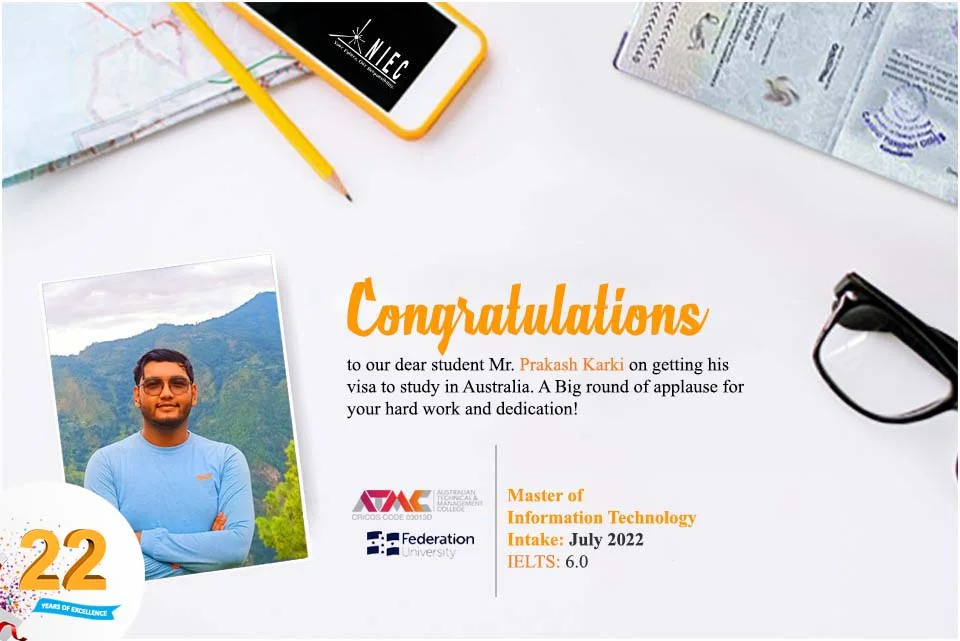
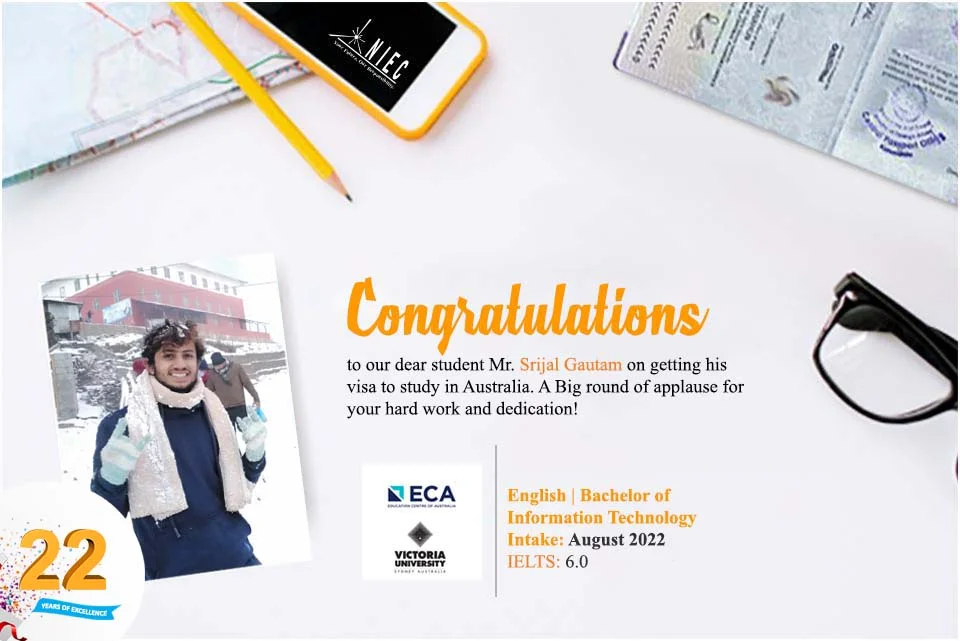
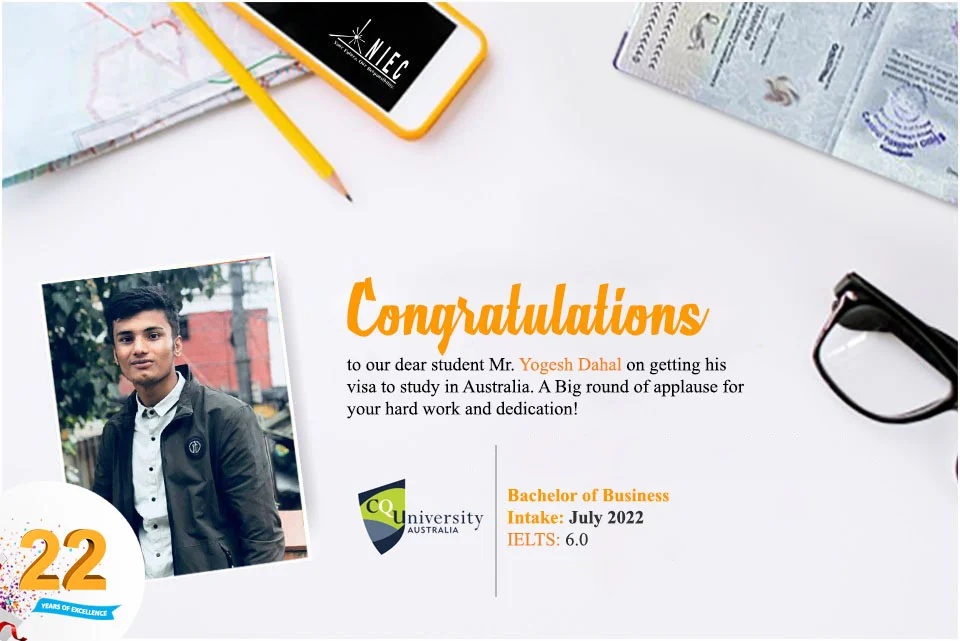
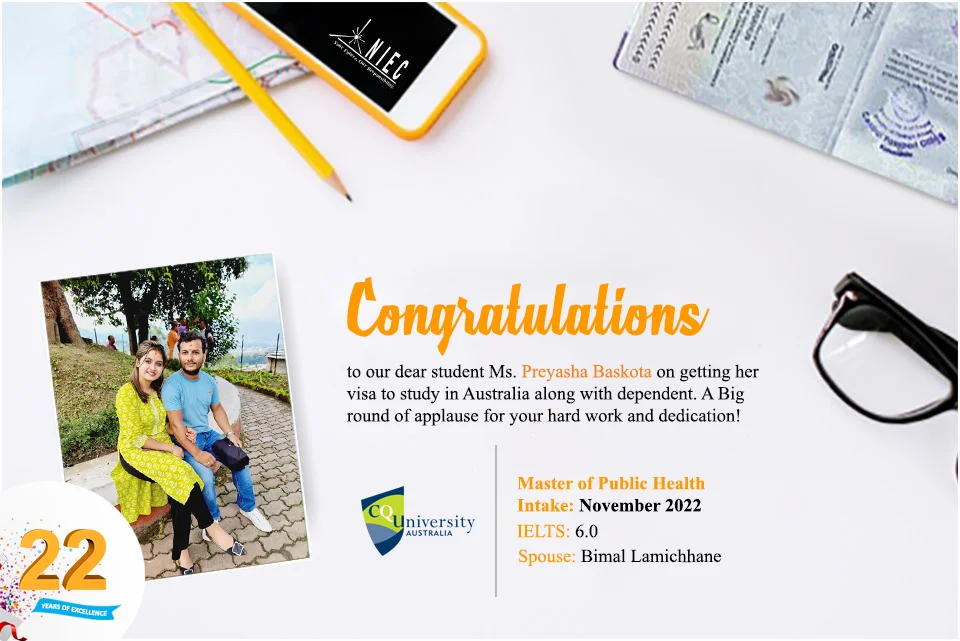
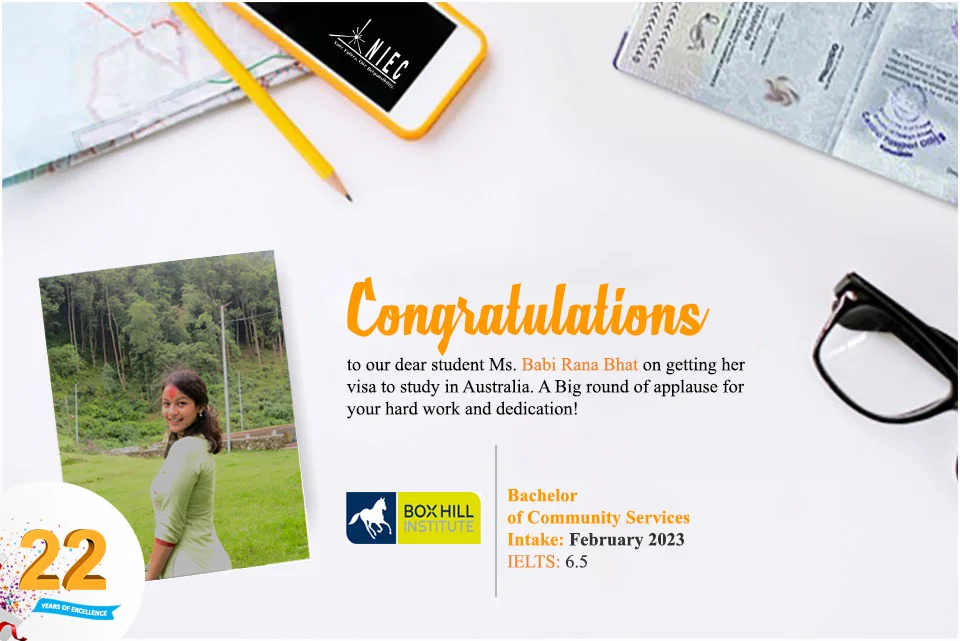
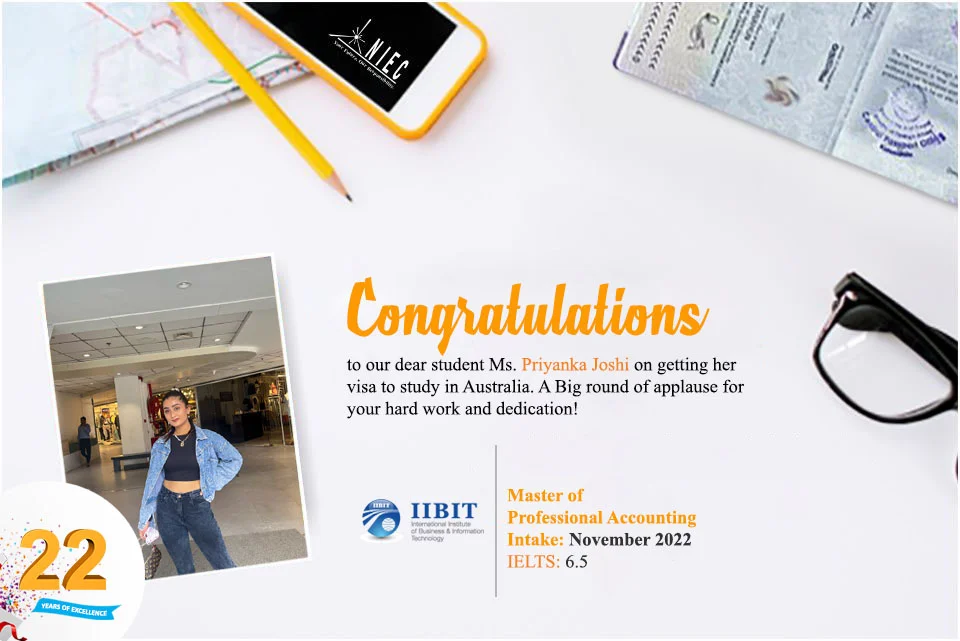
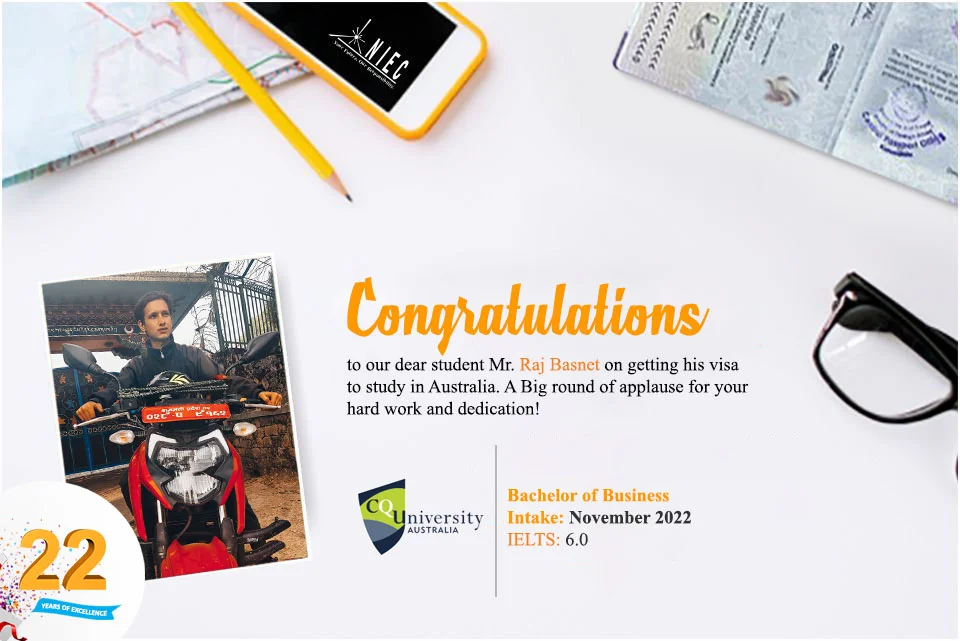
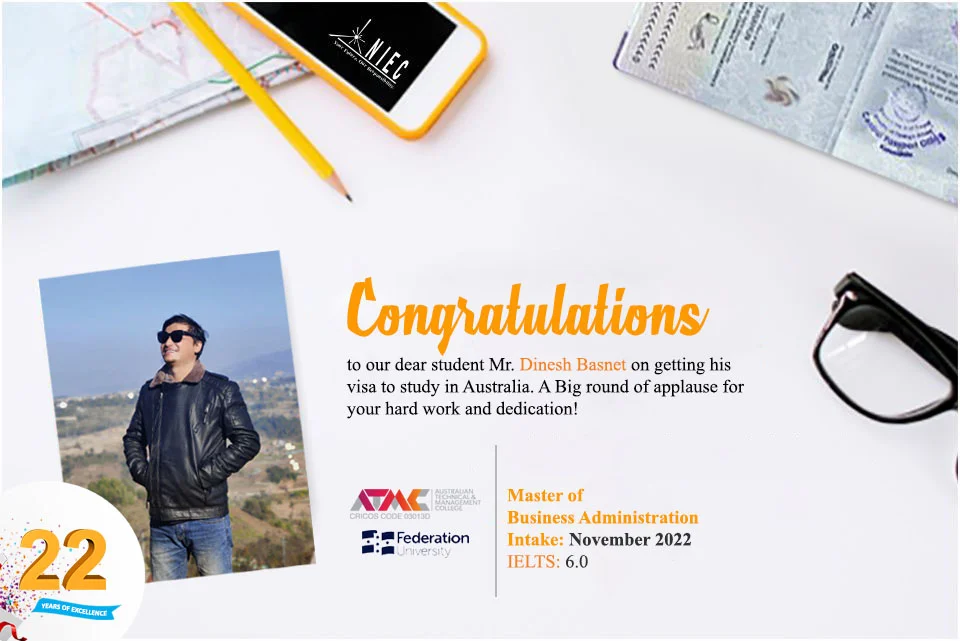
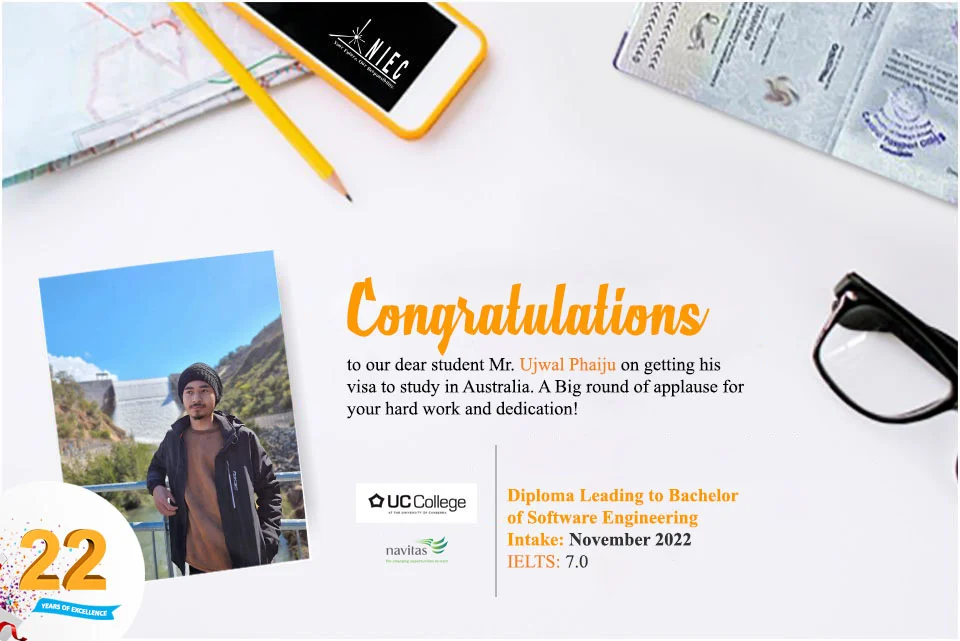
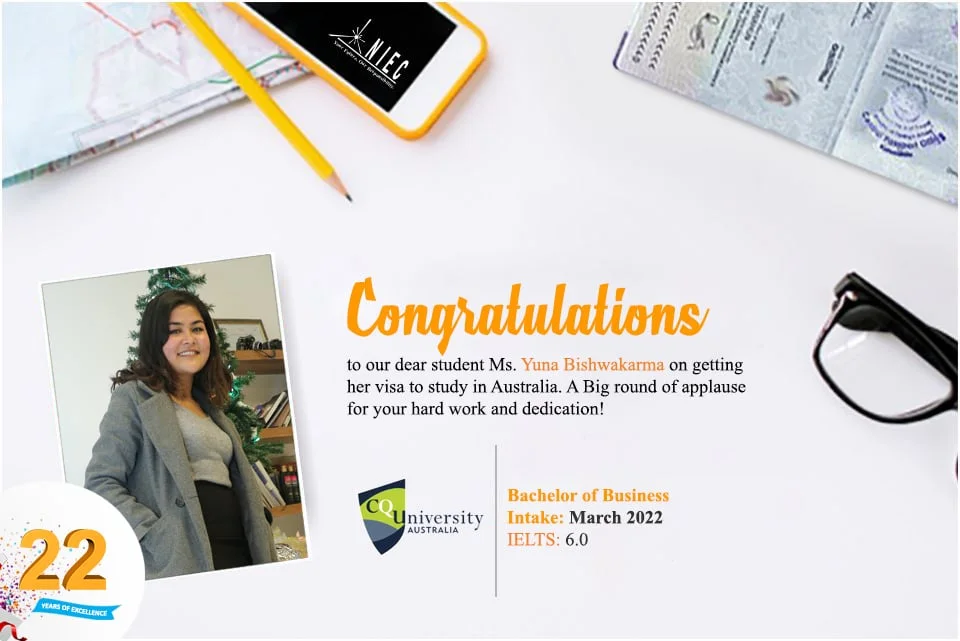
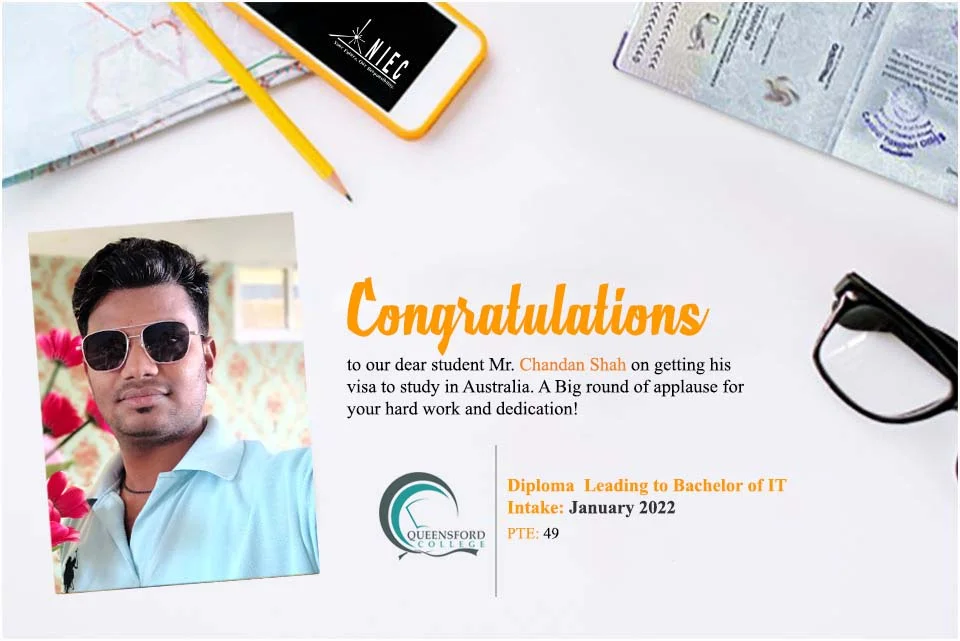
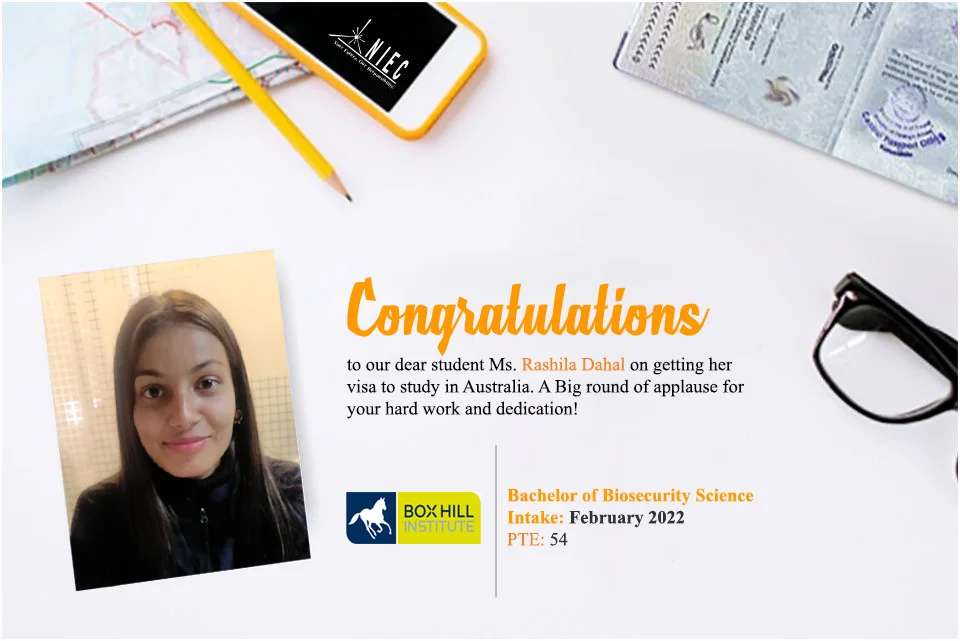
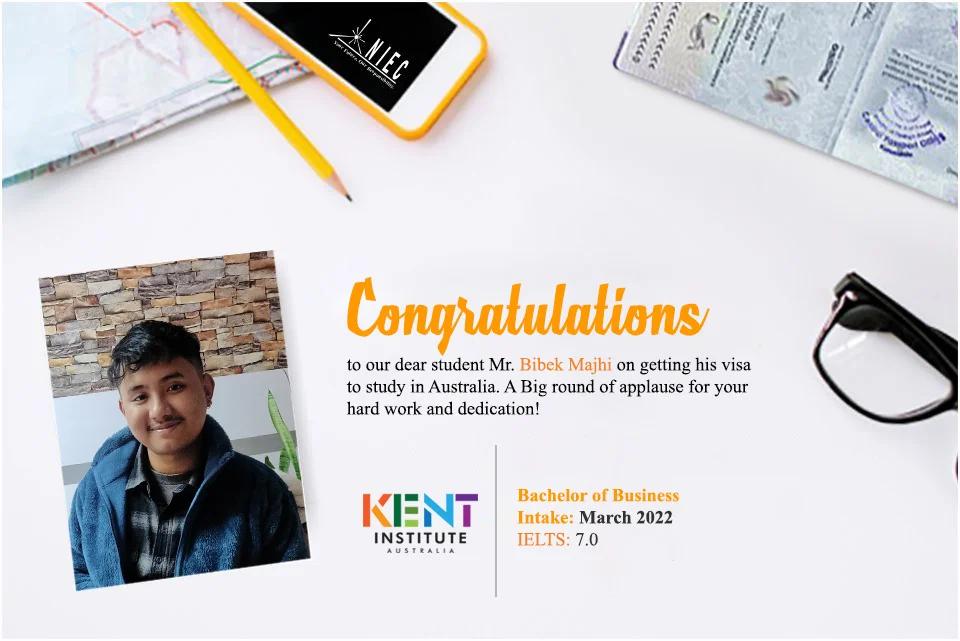
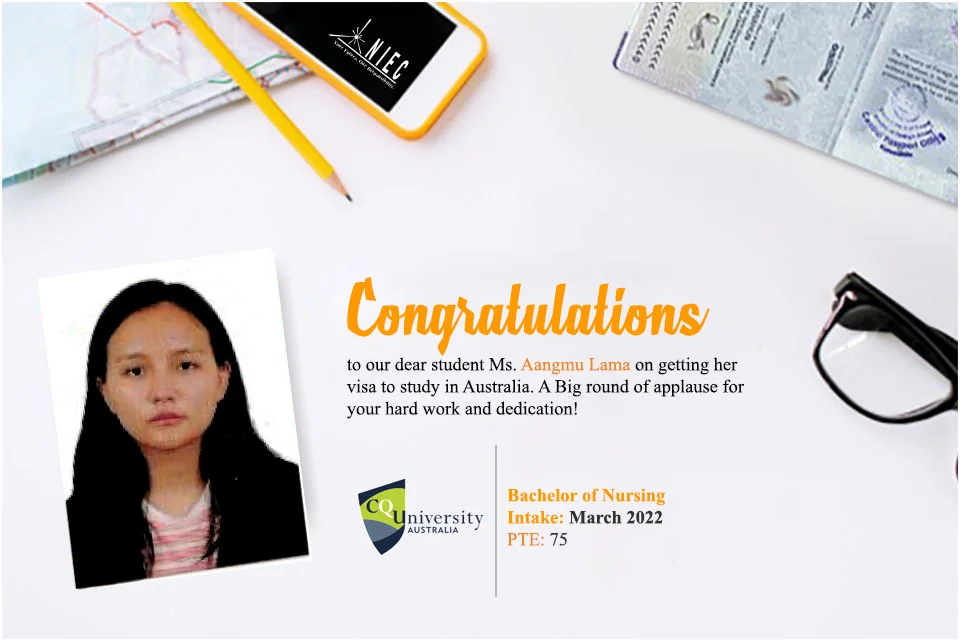
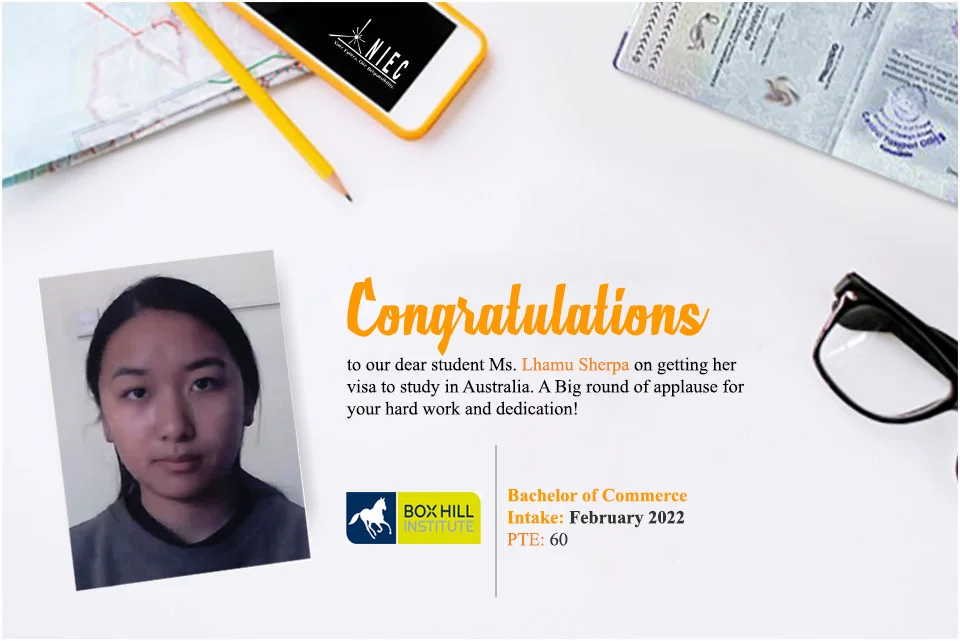
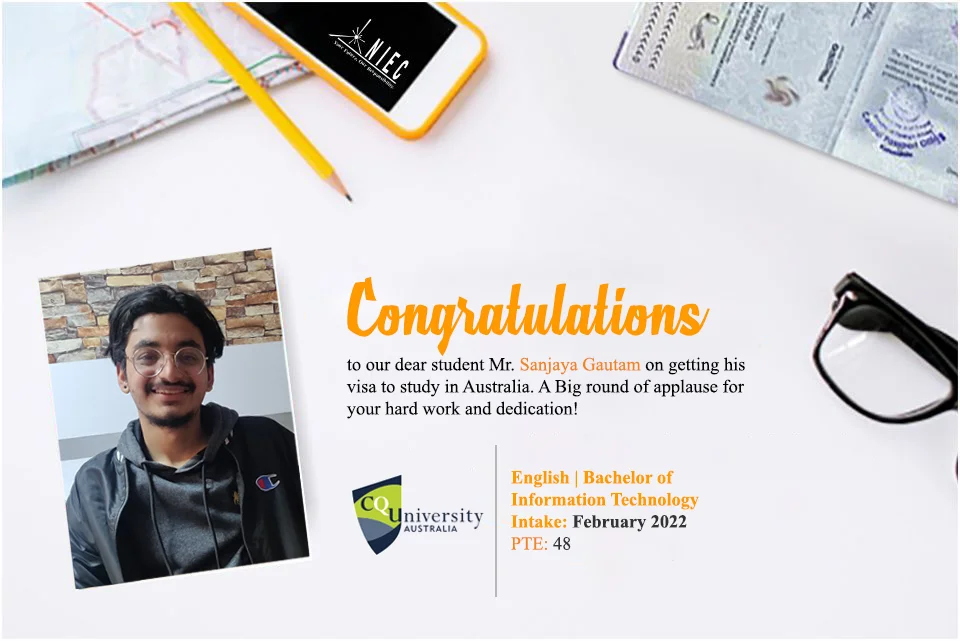
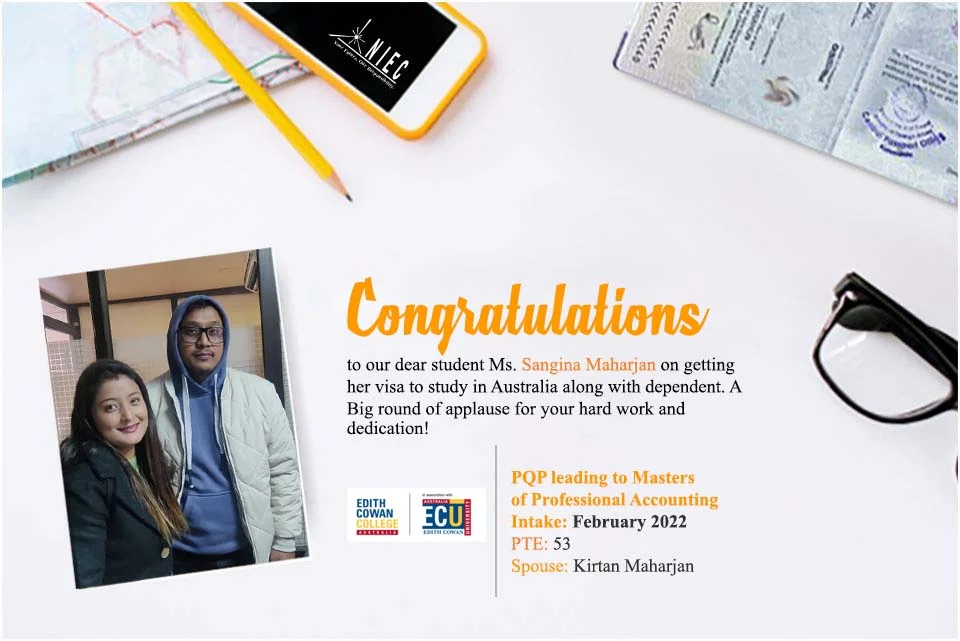
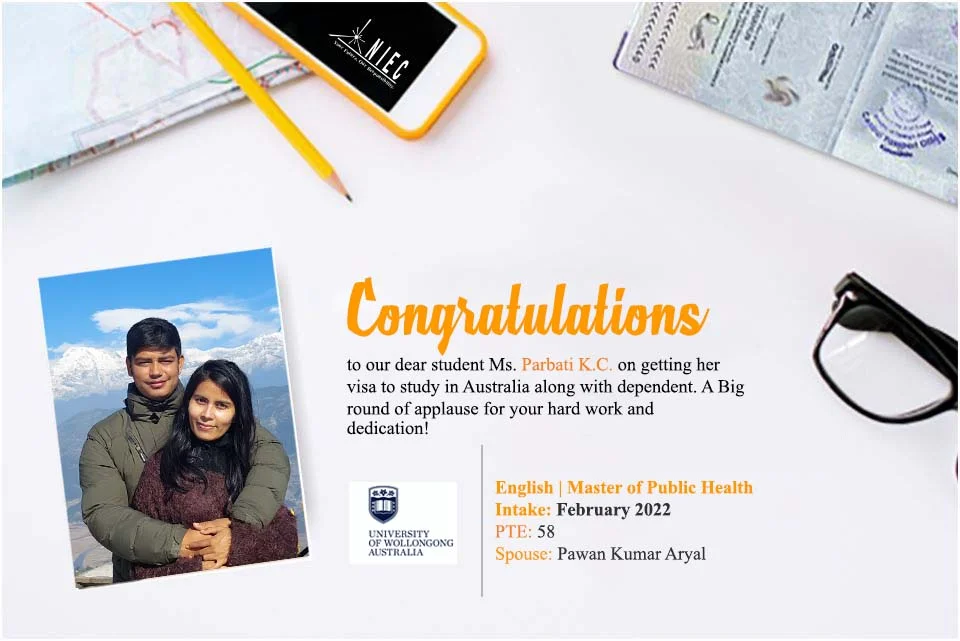
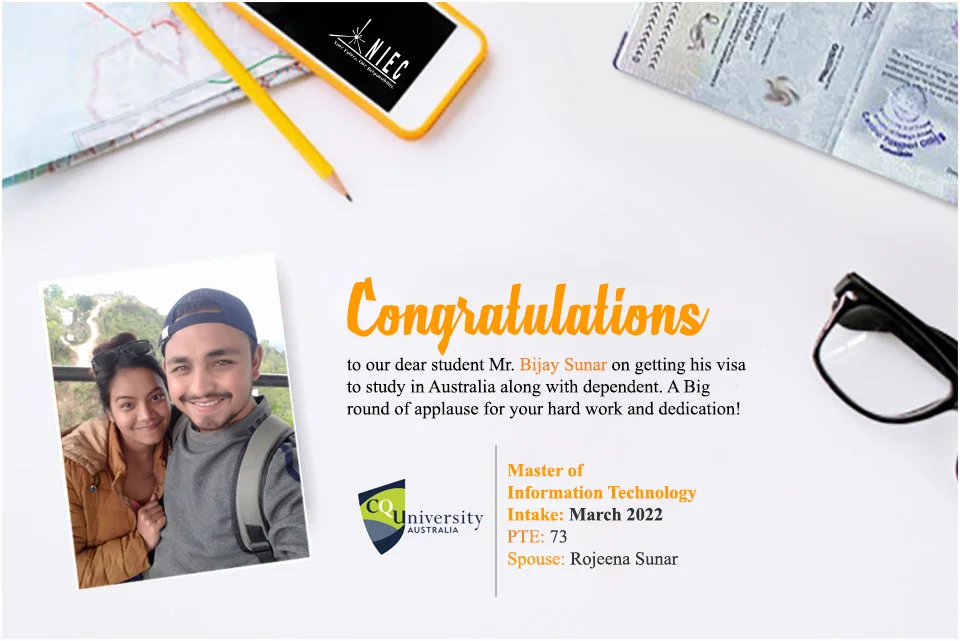
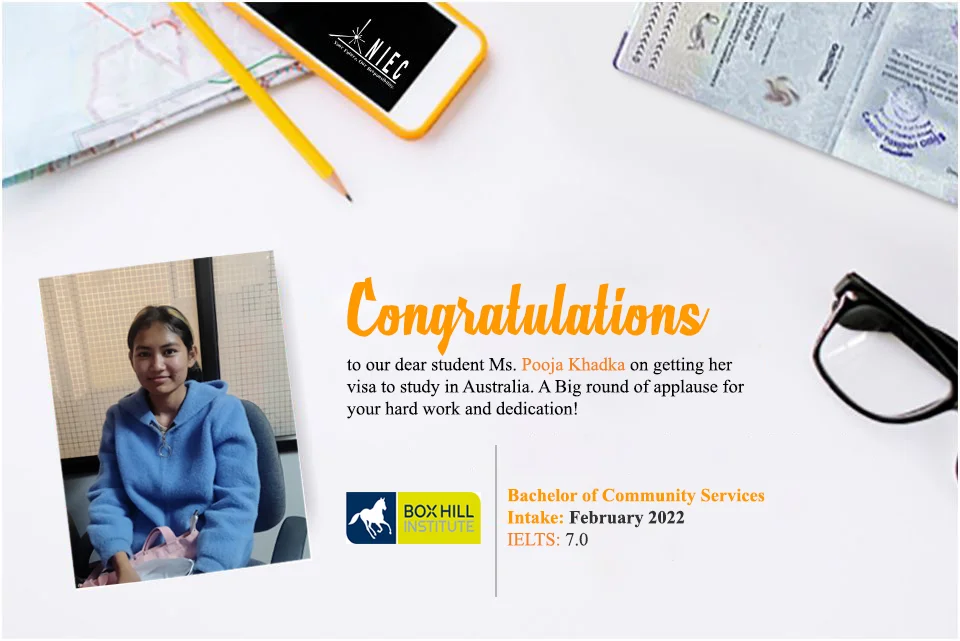
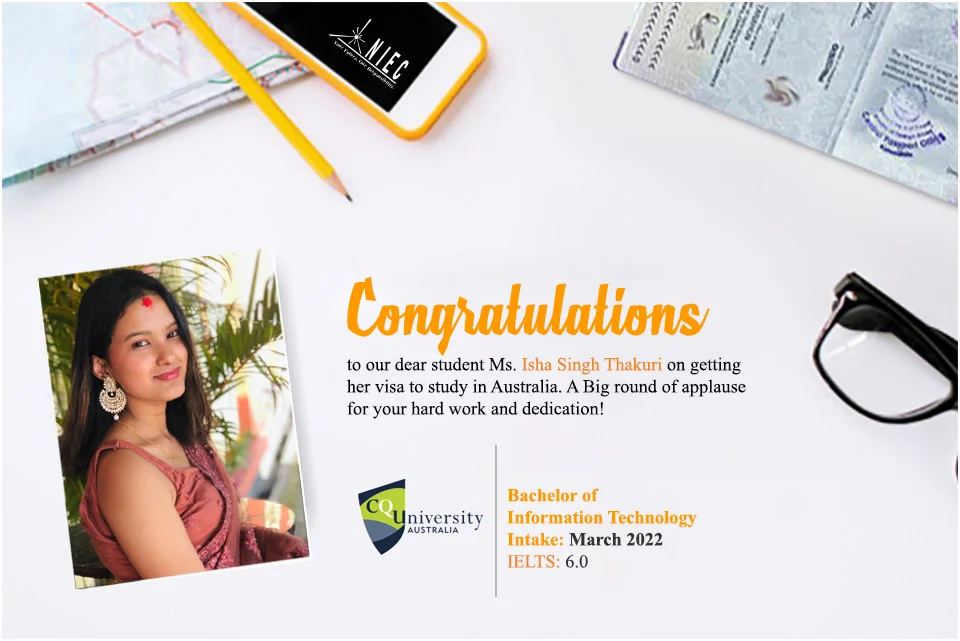
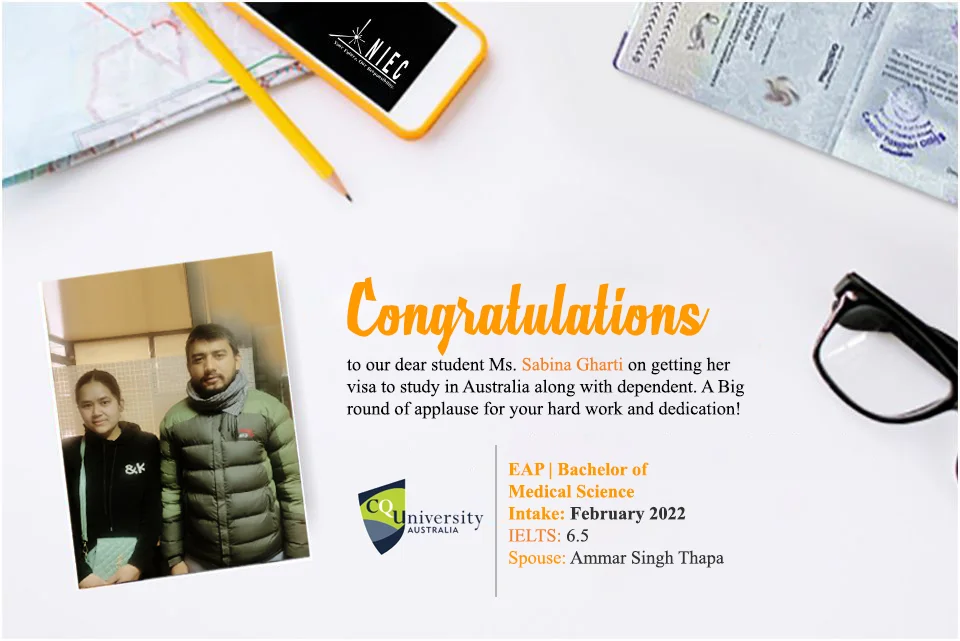
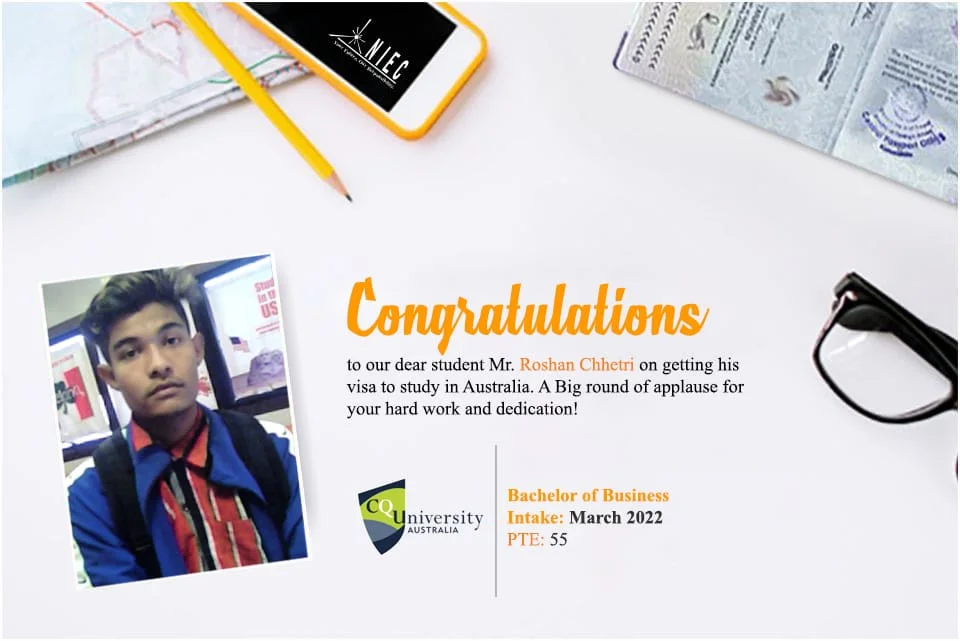
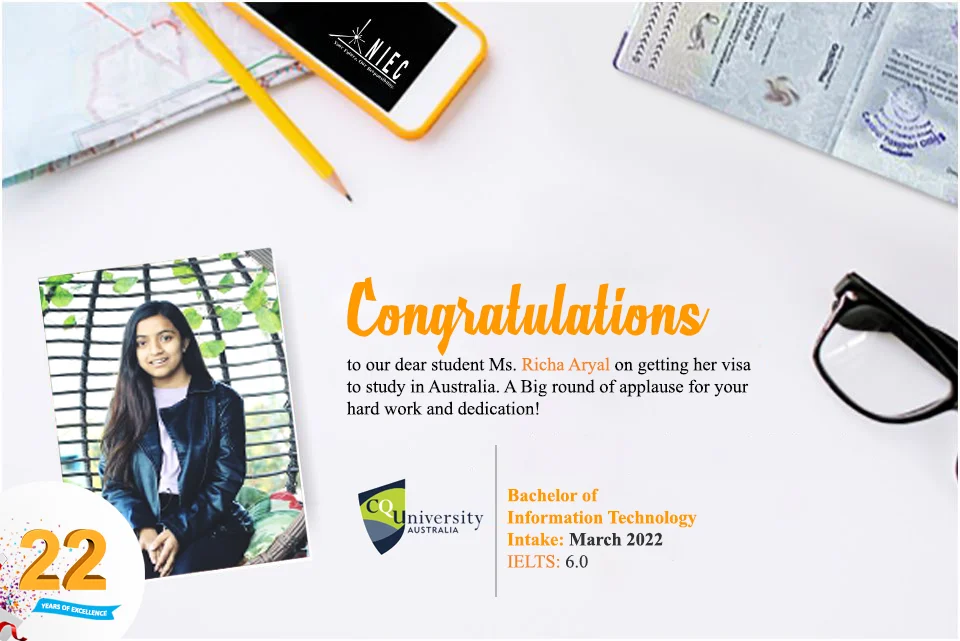
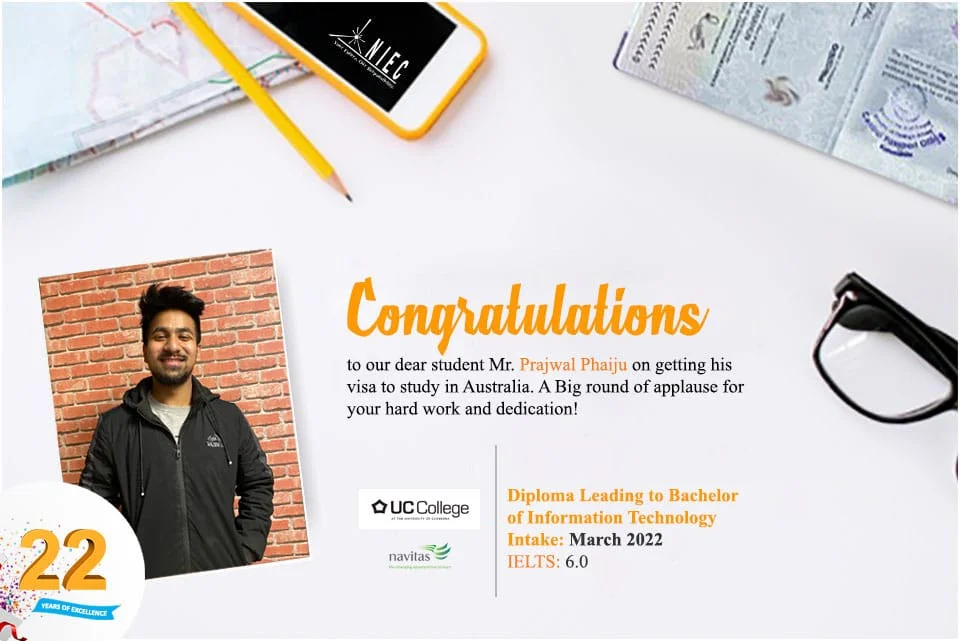
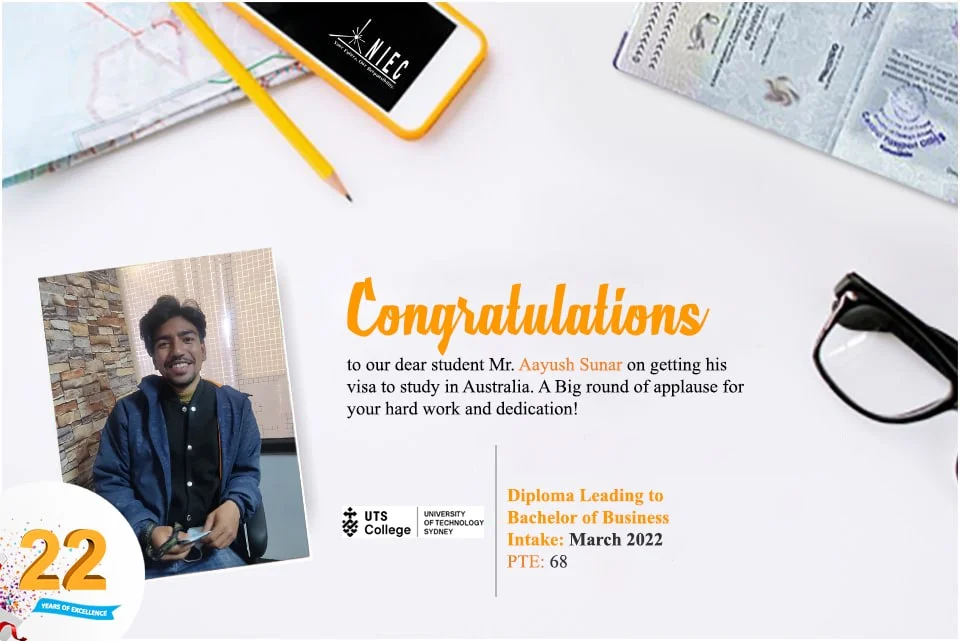
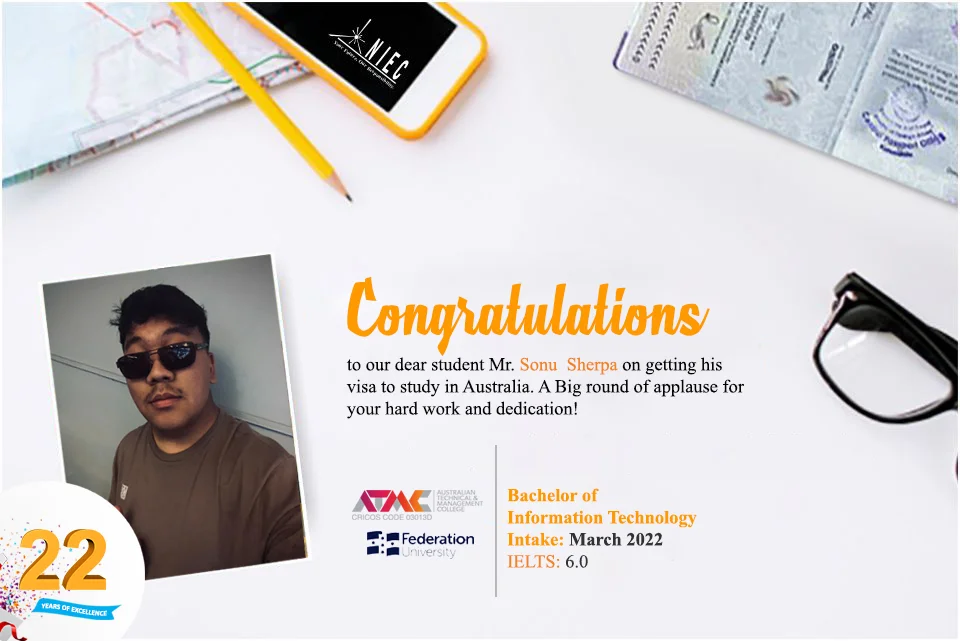
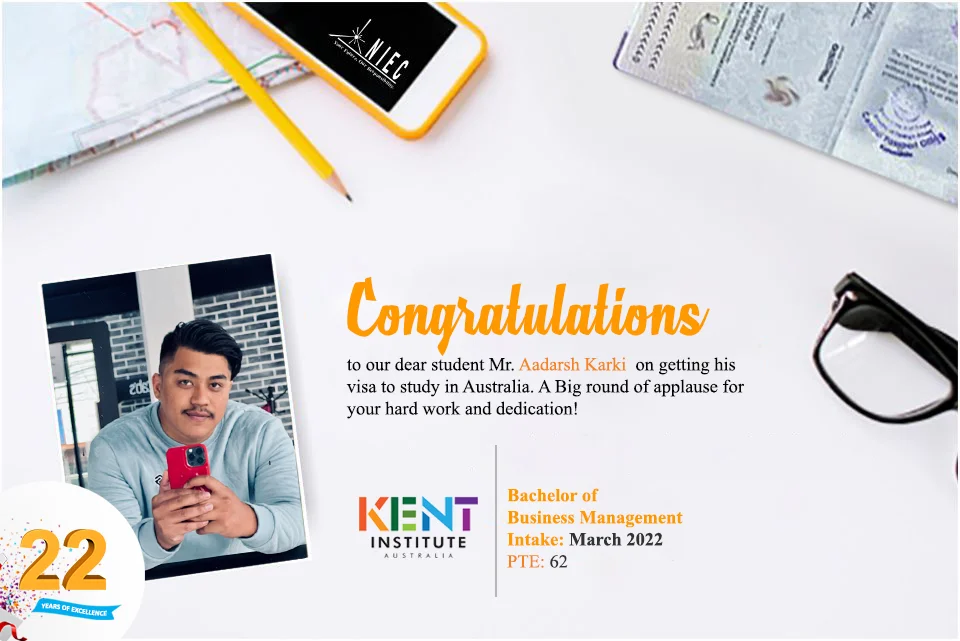
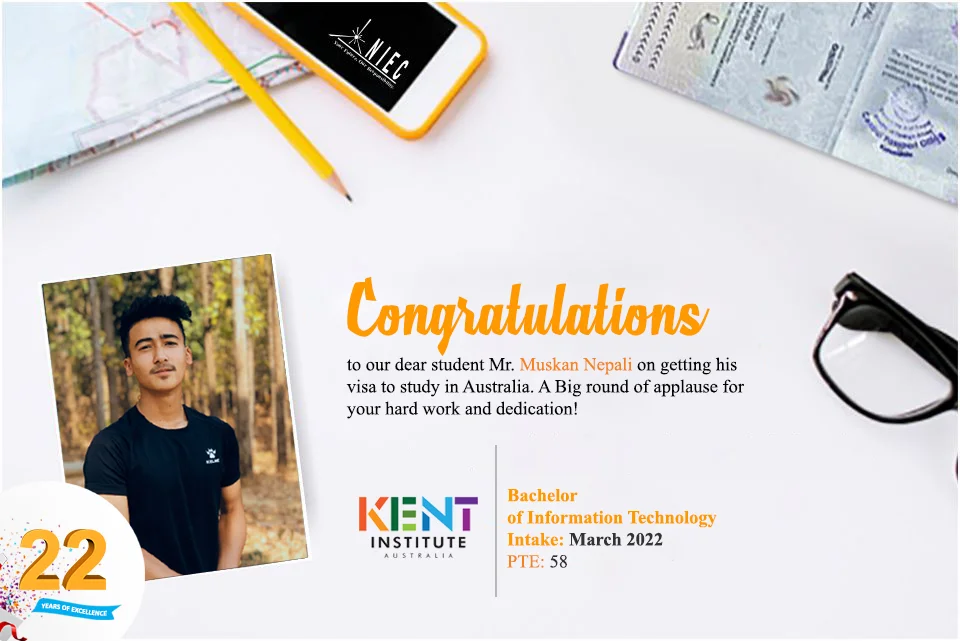
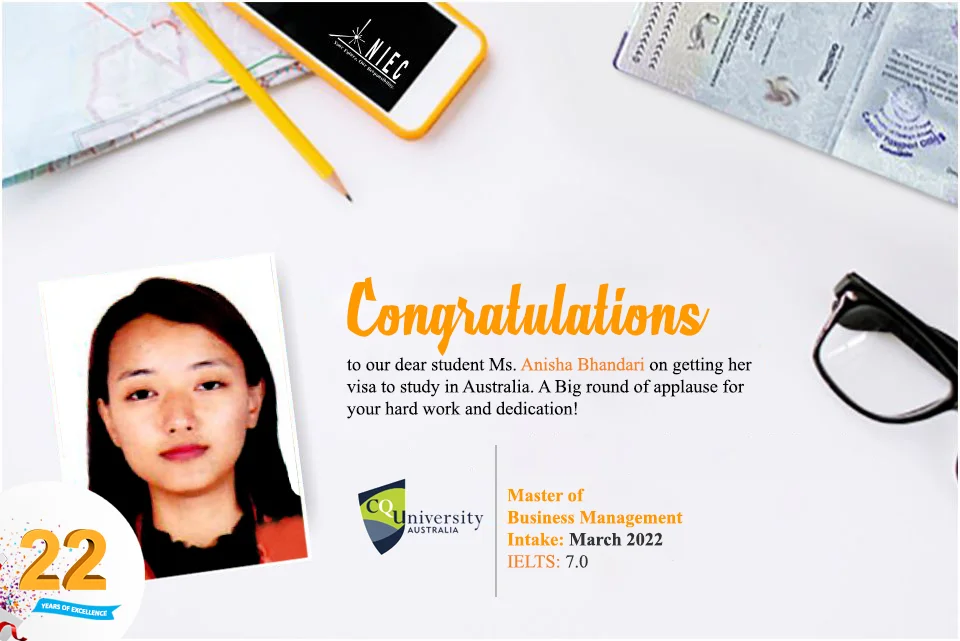
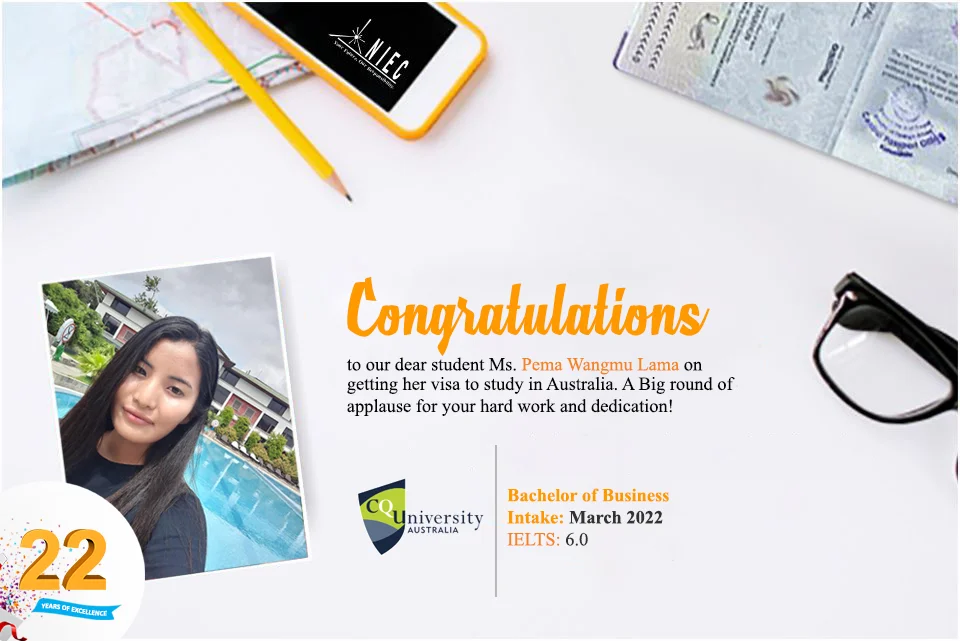
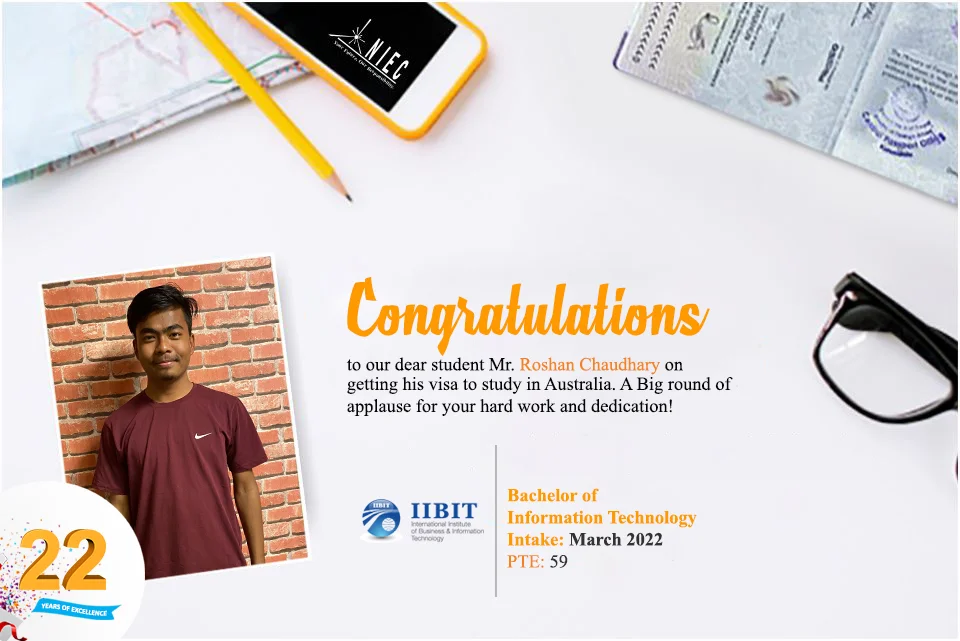
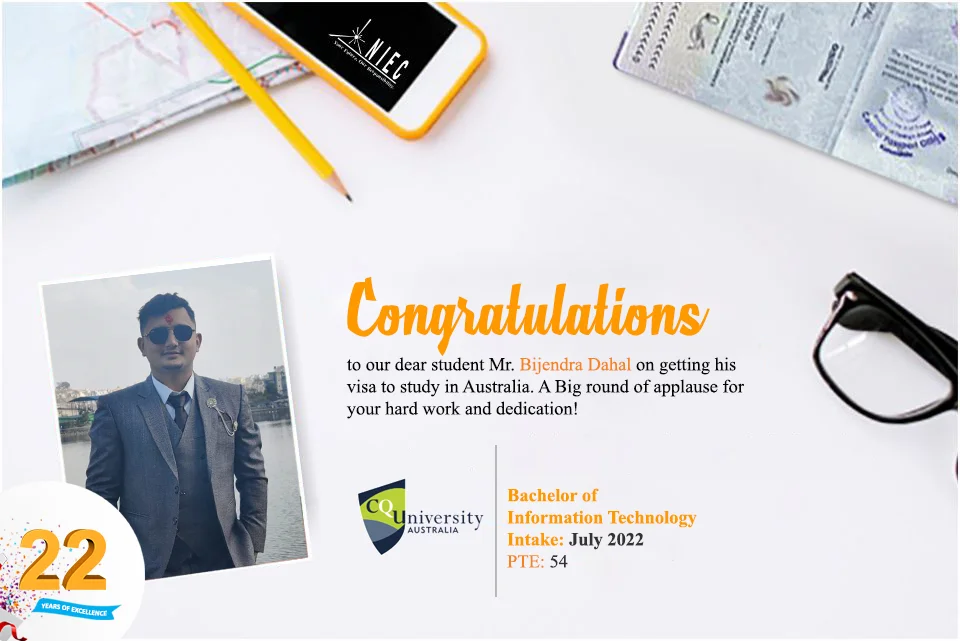
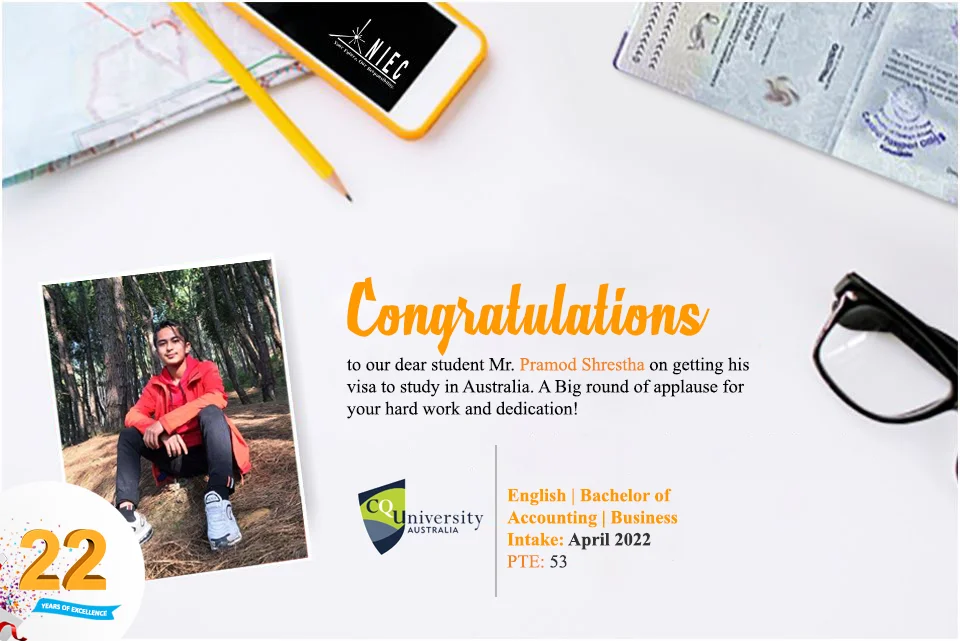
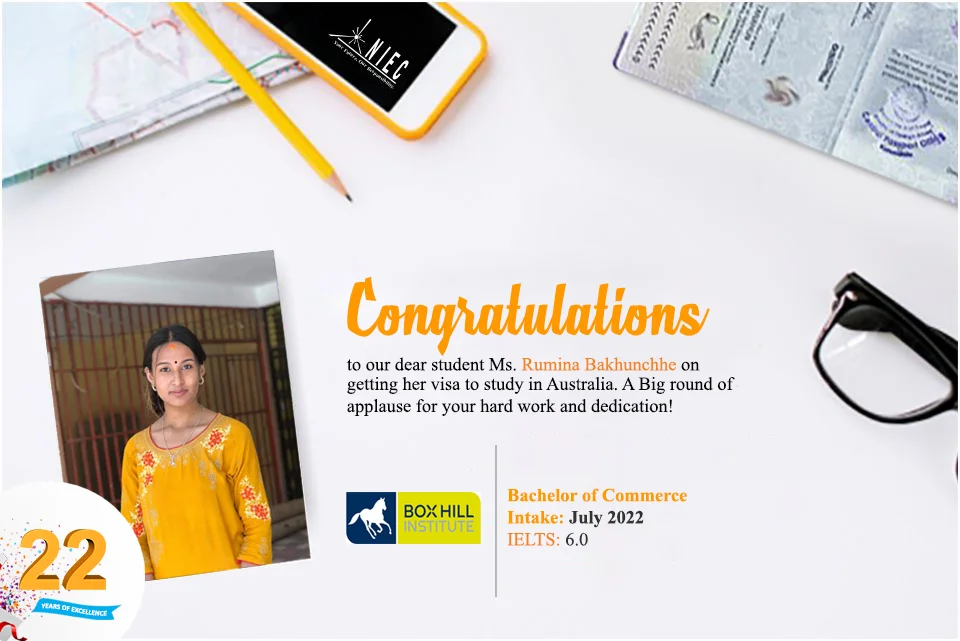
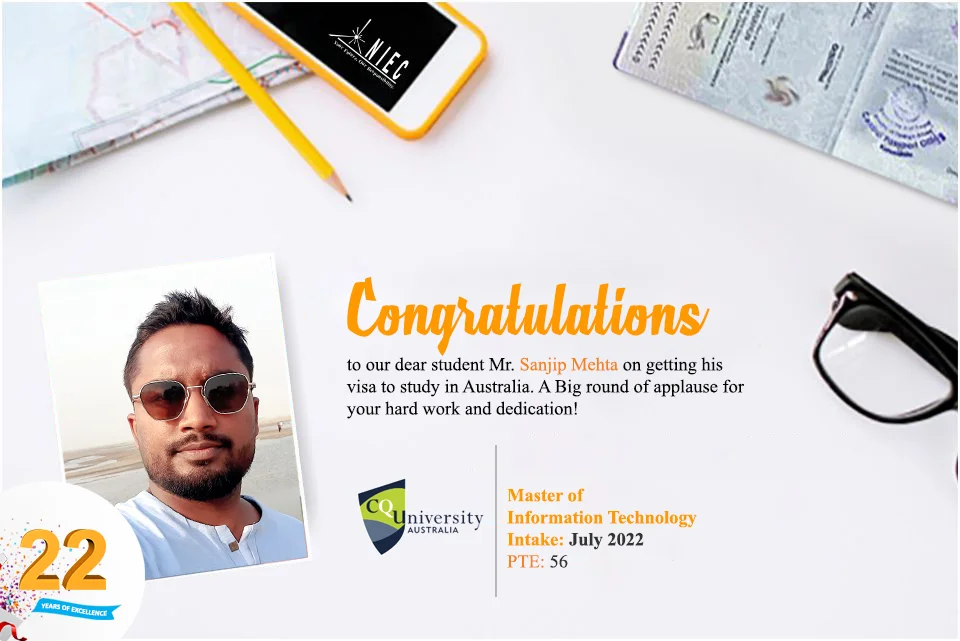
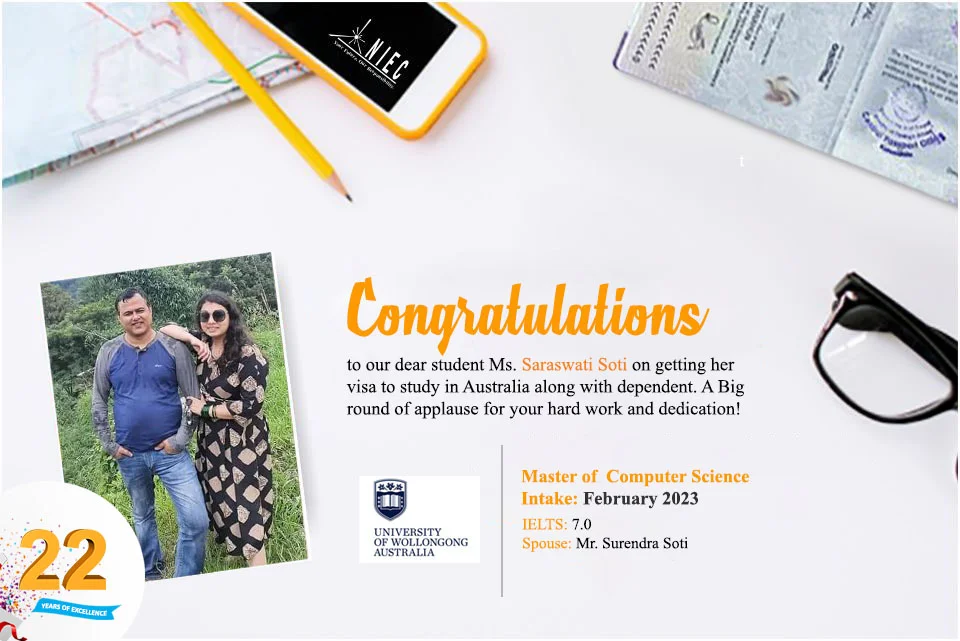
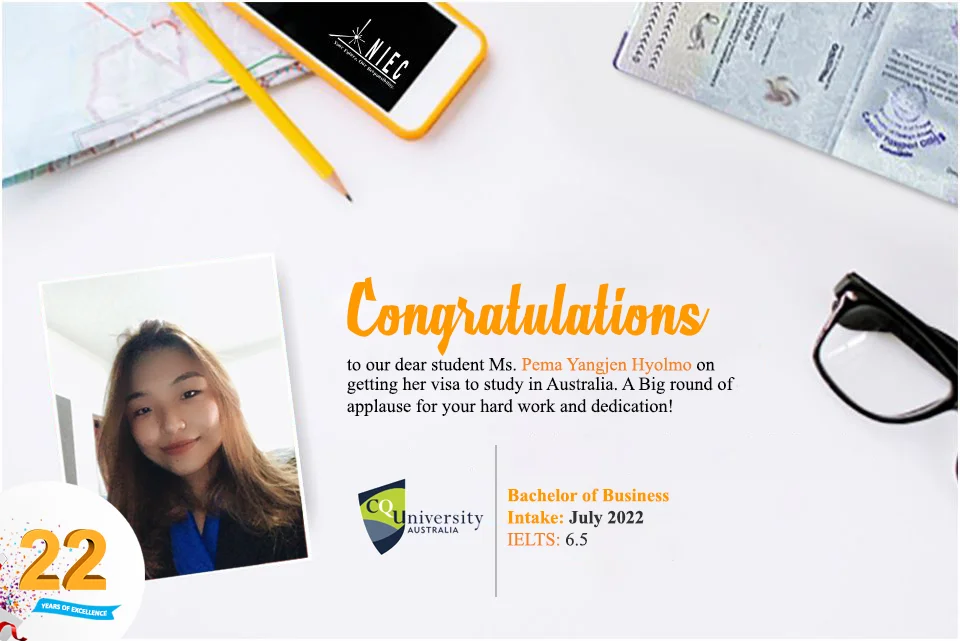
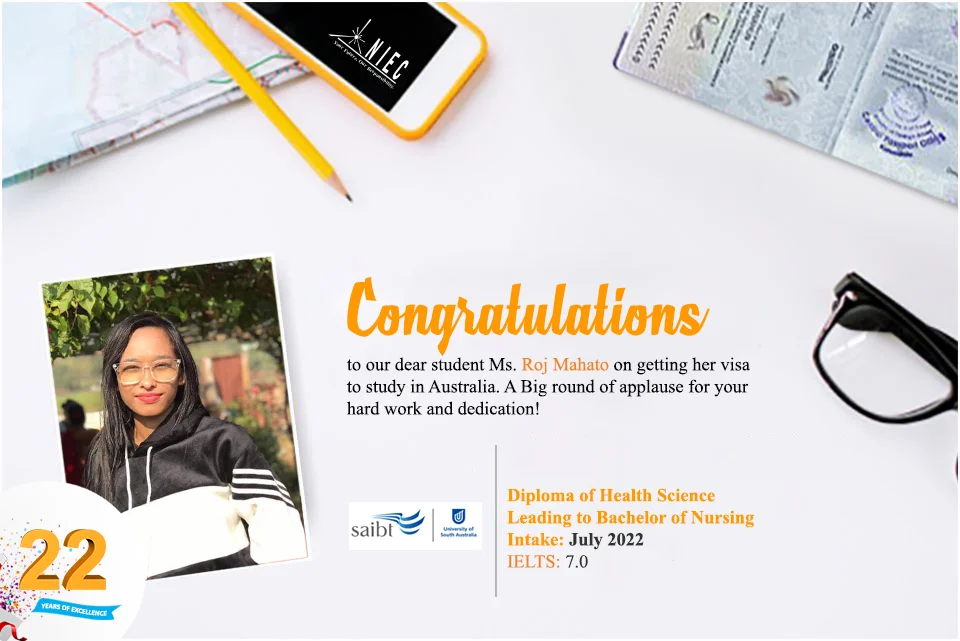
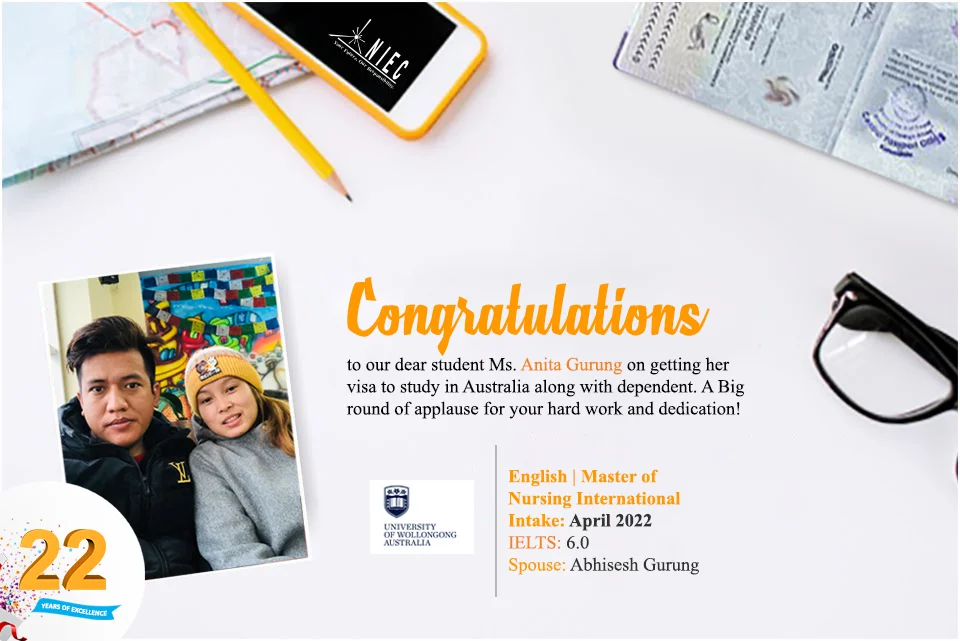
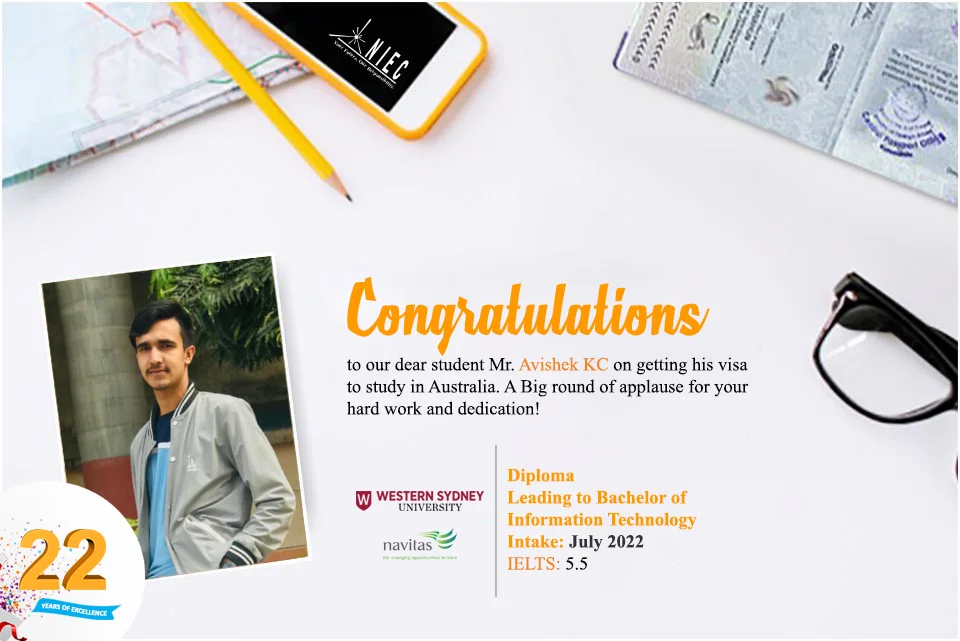
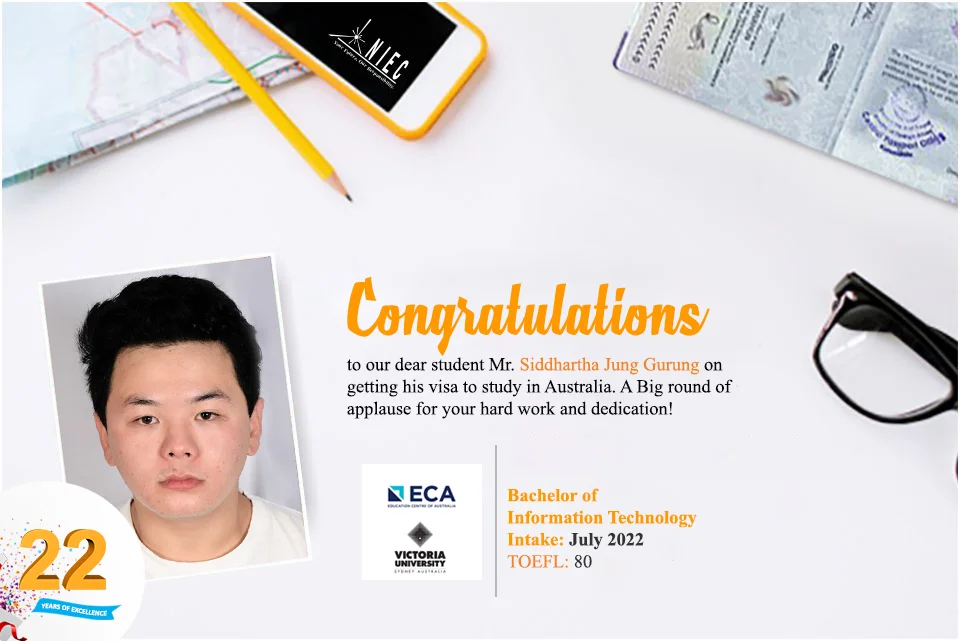
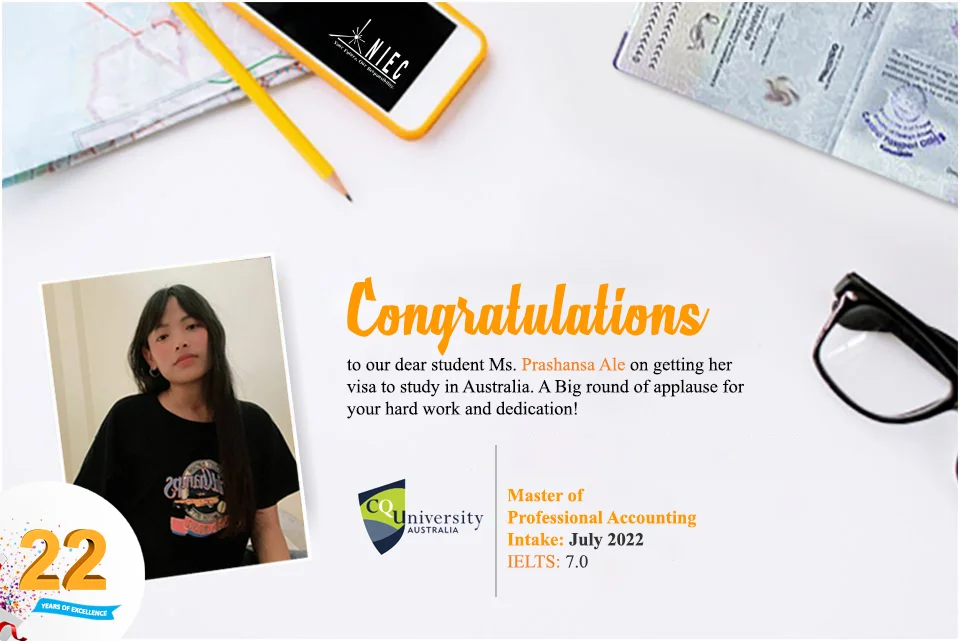
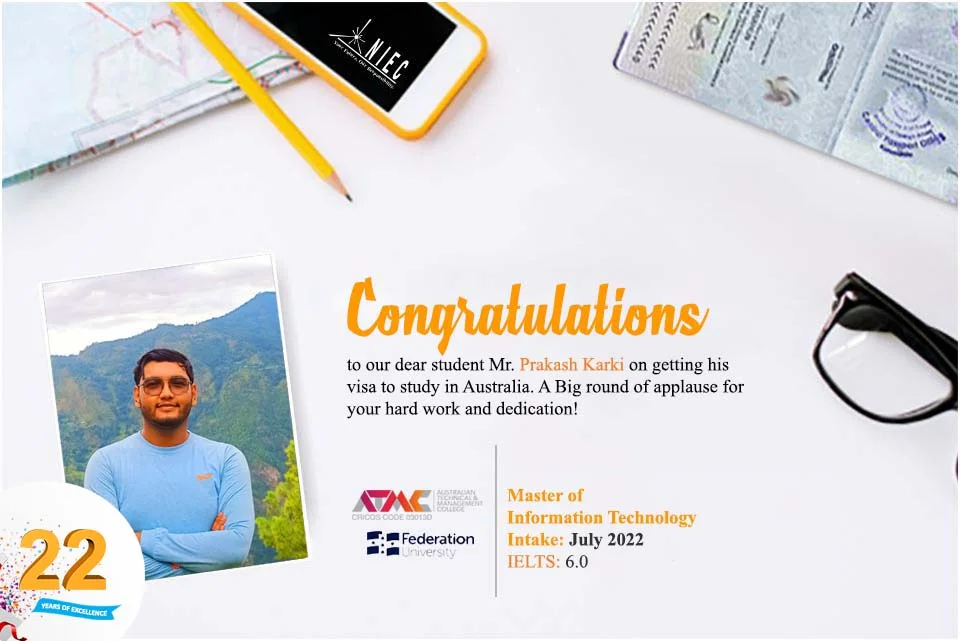
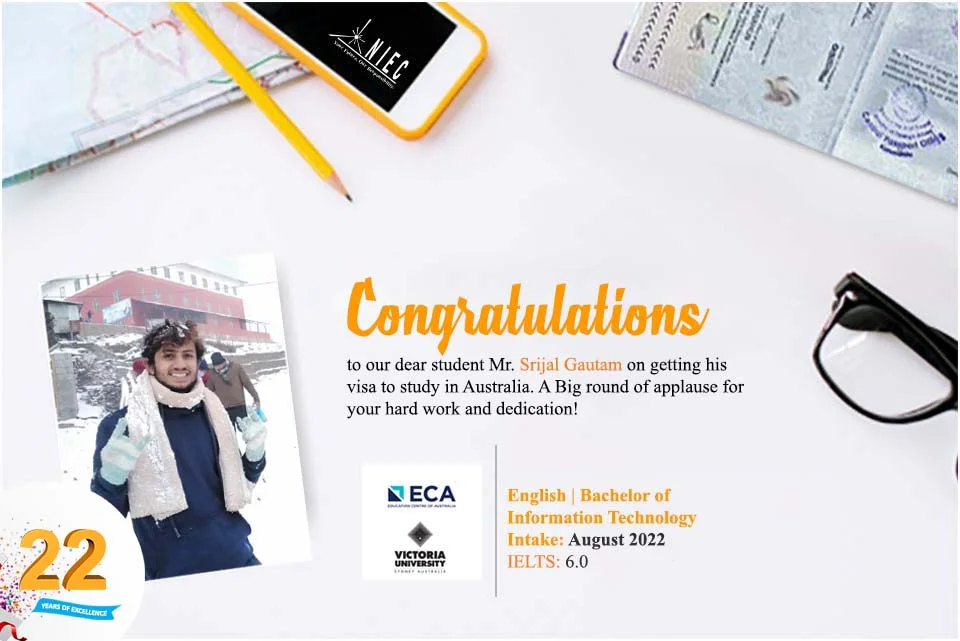
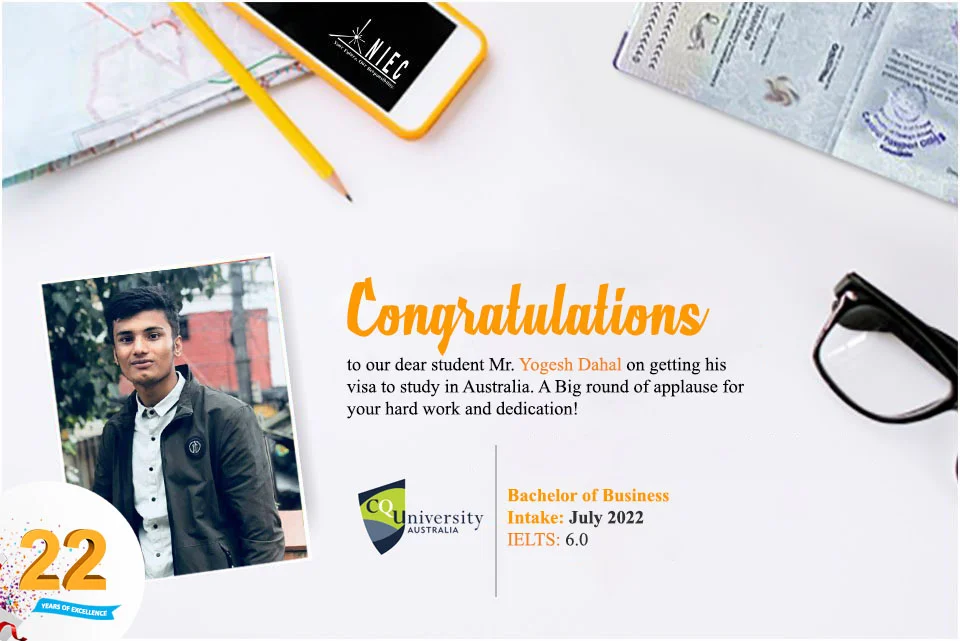
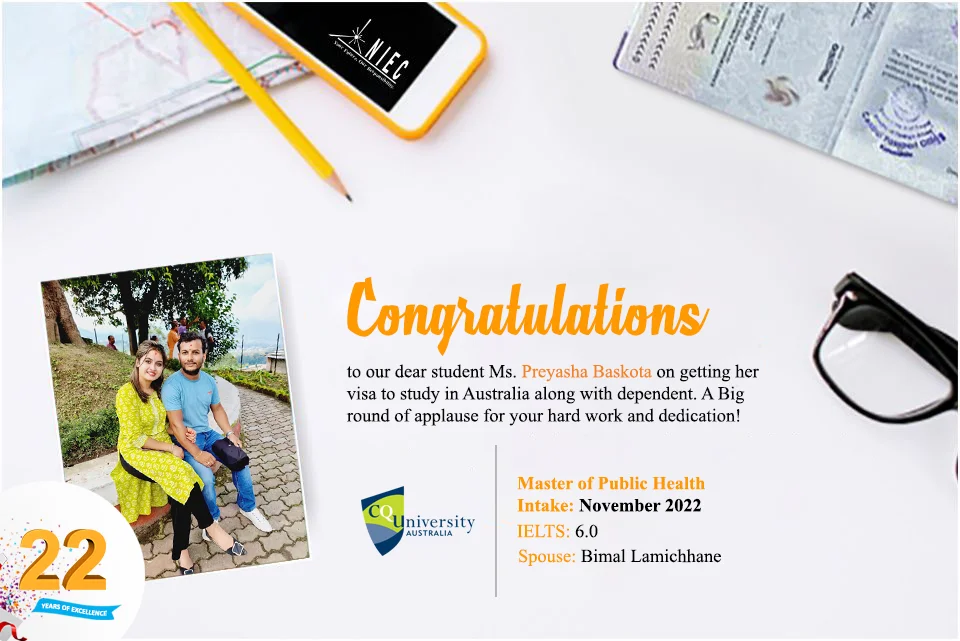
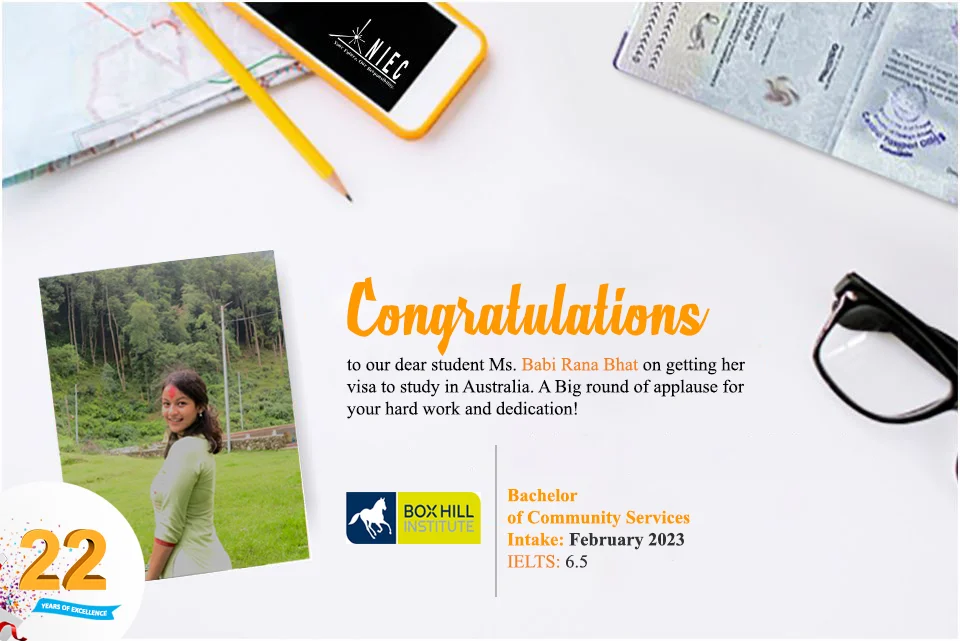
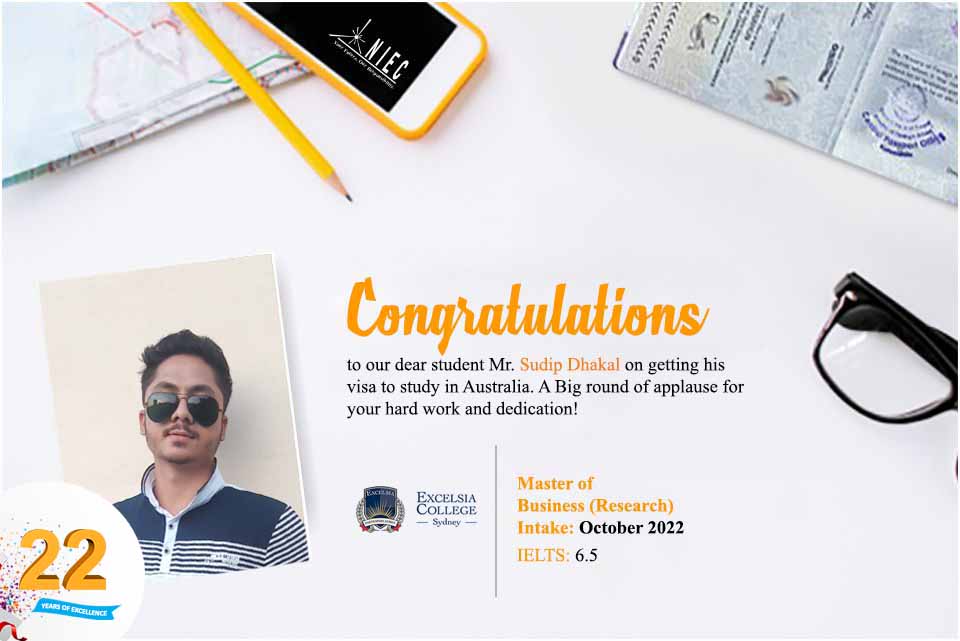
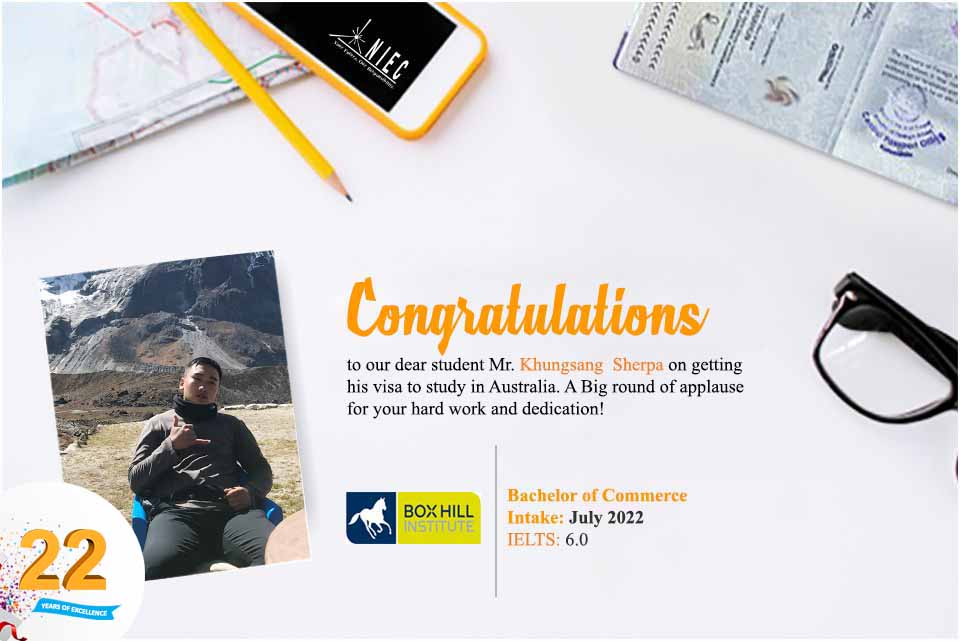
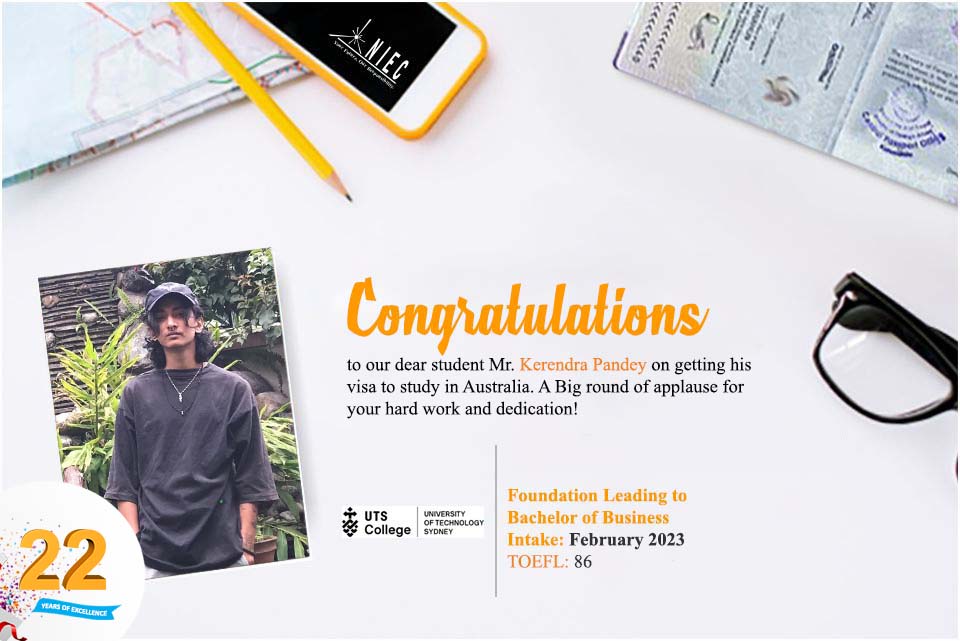
The Australian education system is basically divided into following tiers and provides primary, secondary and tertiary education. NIEC is the best consultancy in Nepal for study in Australia, providing complete guidance for over 25+ years and thousands of visa success stories.
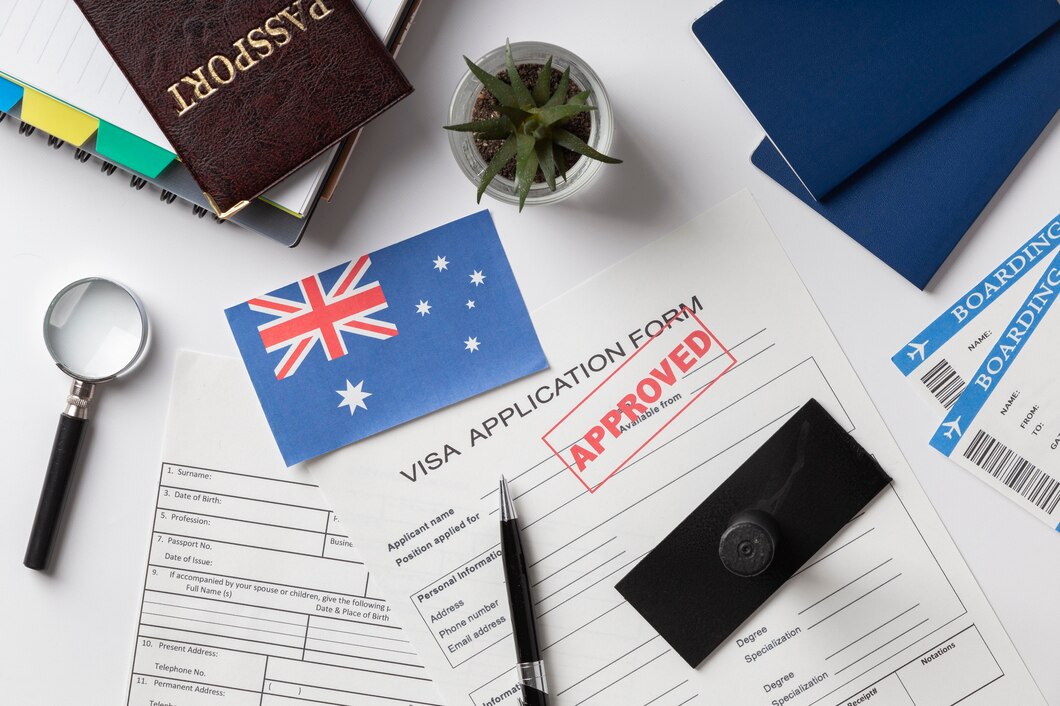
Primary education in Australia lasts 7-8 years, starting at age 4 or 5. It focuses on developing literacy, numeracy, and foundational knowledge, helping children understand the world around them.
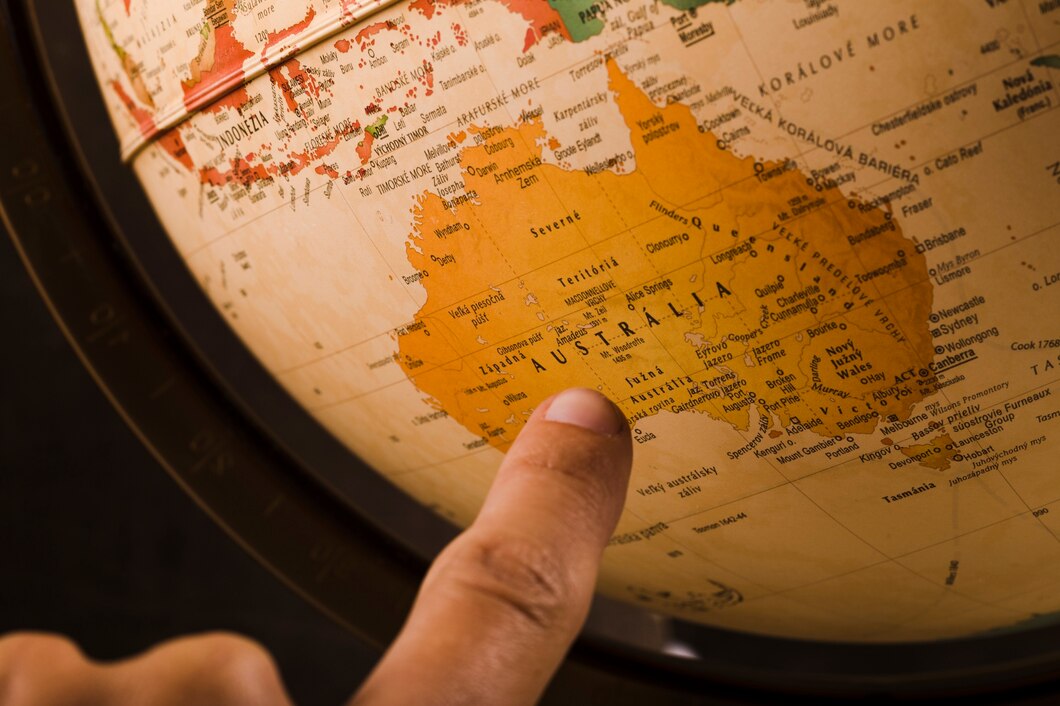
After compulsory education, students can pursue higher education through universities or vocational education and training (VET) in Australia. Those who don't meet entry requirements can explore foundation or pathway programs.
It will be easier if you understand the Australian Qualifications Framework (AQF) that will help you become familiar with the range of study options available in Australia. AQF is a system that comprises of seventeen national qualifications in three sectors: Schools, Vocational Education and Training (TAFE and private providers) and Higher Education (mainly universities) that was designed to ensure that all qualifications titles across the country represent the same high standards of education.
It simply means that if you are studying an AQF qualification, you can be assured that you institution is authorized by the government and is nationally accredited. It allows flexibility as you can easily move from one level of study to the next, from one institution to another as long as you satisfy the student visa requirements.
Qualification Type | AQF Level |
| Diploma course | Level 5 |
| Advanced diploma | Associate degrees | Level 6 |
| Bachelor degree | Level 7 |
| Bachelor honours degree | Vocational graduate certificate | diploma
Graduate certificate/ diploma | Level 8 |
| Master Degree | Level 9 |
| Doctoral degree | Level 10 |
Australia offers a wide range of degree options for students and the major degrees popular among international students are as follows:

ELICOS is an abbreviation of English Language Intensive Courses for Overseas Students offered to international students, whose first language is not English and want to improve their Academic English skills with full time study of English. Other commonly used acronyms for ELICOS are English as a Second Language (ESL) and English for Academic Purpose (EAP). International students often study ELICOS to meet the entry requirements for university education. It is important that all ELICOS providers are registered on the Commonwealth Register of Institutions and Courses for Overseas Students (CRICOS).
Australia also offers Vocational Education and Training (VET) which usually requires two years of study and prepares students for work providing students with the opportunity to learn practical job skills. These courses are offered by Registered Training Organizations (RTOs) which includes TAFE institutes. There are currently 59 TAFE institutes that deliver VET training across Australia. It prepares students for work in a career that does not need a university degree. RTOs must also register with the Australian Government’s Commonwealth Register of Institutions and Courses for Overseas Students (CRICOS) in order to offer courses to international students.
Technical and Further Education (TAFE) programs provide you employment related qualifications which are certified under the Australian Qualifications Framework (AQF). The qualifications range through Certificate 1 to 4 up to Diploma and Advanced Diploma. TAFE Diploma and Advanced Diploma provide practical training in a wide range of occupations including technical and or/ management functions and are recognized for credit towards degree studies. Visit NIEC, one of the best consultancy in Nepal for study in Australia.
Associate Degree in Australia usually is a 2 year study program that follows year 12 or equivalent. The degree program is shorter than other higher education qualification and can be a pathway to a Bachelor degree. Students learn about the foundations of their field where the degree program covers broad theories that helps you develop skills related to employment.
The Diploma, Advanced Diploma and Associate Degree are AQF Level 5 and Level 6 respectively.
International students who do not meet the entry requirements of an undergraduate program also take Diploma courses as a pathway. These programs are generally promoted by TAFE, private colleges and higher education institutions. Usually, any student who successfully completed the Diploma will be eligible to gain entry into the second year of an undergraduate degree. Diploma programs are marketed as competitors to foundation programs.
Foundation programs are also known as foundation years or university preparation courses that offer international students an alternative means to access post-school institutions. Students who do not meet the entry requirements of an undergraduate Bachelor degree program often take up foundation programs as a pathway. These programs tend to normally require one year of study, have minimum entry requirements, and often guarantee entry to a particular university course provided the student meets the required standards.
Express or Accelerated foundation programs are shorter than one year in length while the ‘extended’ foundation programs allow students to undertake a longer program than normal.
The Australian Qualifications Framework (AQF) ranks bachelor and post graduate degrees higher than TAFE qualifications as these degree programs prepares you for your professional careers. An undergraduate degree program also prepares you for your postgraduate study. The duration of a Bachelor’s Degree ranges from three to four years depending upon the choice of course and an Honours degree may be awarded after an additional year of research.
The programs and degree options include a Bachelor degree that is AQF Level 7 and professional degree, graduate entry degree (Graduate certificate or Diploma) and Honours degree that are AQF Level 8. Visit NIEC, one of the best consultancy in Nepal for study in Australia.
Students are offered Coursework Master’s that involves coursework and research, Professional Master’s that involves work- based projects and Research Master’s that consists of research and a thesis. Master’s Degrees in Australia are AQF Level 9 and usually require a two year study at a university.
The highest award offered by an Australian University is a Doctoral Degree which is AQF Level 10 and generally a research degree where some programs might also have a course work component. The course duration of a doctoral degree in Australia is usually 3 years.
Learning about the types of course offered in Australia is not enough. As an international student, you should now consider the right course and university for yourself, the admission procedures, immigration rules, tuition and living costs required to begin your student life in Australia. Visit NIEC, one of the best consultancy in Nepal for study in Australia.
As with any other study destination, choosing the right course and university begins with researching your study options. You should carefully research different courses, institutions offering the courses including its location and fees. It is always easier when you decide on your course and then find the education provider that offers the course to select best fit university that suits your requirements. You can always narrow down your choices comparing scholarships, various facilities and support offered to international students, university rankings or, you can also take help from our experts who can help you make your decision. Visit NIEC, one of the best consultancy in Nepal for study in Australia.
It is suggested that you check the Academic and English language entry requirements and deadlines to ensure you are eligible before you apply. In case you do not meet the entry requirements, you may have to consider a different course or you can also opt for different pathway programs offered.
Students are required to contact an education agent that represents the institution in their country in order to commence with their application process.
International students required to meet the entry requirements in order gain admissions. These entry requirements are the Academic and English language requirements and the details are usually clearly mentioned on the university website. The entry requirements could vary depending upon the course and the education provider and it is best if you contact your education agent or your education provider for more details on the entry requirements.
Institutions in Australia can have varied academic requirements as they are free to determine their entry requirements for the courses. Generally, an undergraduate degree requires successful completion of Year 12 with not less than 60% or equivalent on average. Students who do not meet the entry requirements are suggested Foundation or Diploma programs. Entry into a postgraduate degree requires successful completion of a Bachelor degree with not less than 60% or equivalent on average. Visit NIEC, one of the best consultancy in Nepal for study in Australia.
International students are also required to the meet the English language proficiency requirements as Australian education institutions only accept students with an appropriate level of English proficiency. The requirements could vary however, in general, undergraduate degrees require an overall IELTS score of 6.0 with not less than 6.0 in each band or equivalent and graduate degrees require an overall IELTS score of 6.5 with not less than 6.0 in each band or equivalent. Students who do not meet the English language requirements are suggested different English language programs.
It is highly suggested that students check their education institution’s website to learn about their tuition fees however, you can see the cost of education on average as mentioned in the Australian Government- Study Australia website below:
Various scholarships are offered by the Australian Government, various education providers and other public or private organizations for international students seeking to study in Australia. Some of the major programs as mentioned in the Australian Government- Study Australia website are as follows:
It aims to promote education links, knowledge, and brings together scholarships offered by the Department of Foreign Affairs (DFAT), Department of Education and the Australian Centre for International Agricultural Research (ACIAR).
Over 1000 scholarships of up to $15,000 per student are available every year to support domestic and international students studying at regional Australia in qualifications from Certification IV level and above. Visit NIEC, one of the best consultancy in Nepal for Australia.
Over 1000 scholarships of up to $15,000 per student are available every year to support domestic and international students studying at regional Australia in qualifications from Certification IV level and above
These scholarship programs are offered by education providers to qualifying international students based on their academic merit. Students can directly contact the admissions team or, their education agent for information on the scholarships offered by their education provider.
It is important that international students meet the financial requirements set by the Department of Home Affairs to obtain their student visa to study in Australia. Knowing the average living costs is an important preparation and here are some costs associated with living and studying in Australia:
International students require a student visa, specifically the Student visa (subclass 500) in order to study in Australia. This visa allows international students to live, work and study in Australia for a maximum of five years in line with your course.
In order to obtain your student visa, you are required to apply to an Australian education provider with the help of an education agent. We are here to help you and guide you through university application and visa processing. Visit NIEC, one of the best consultancy in Nepal for Australia.
How to apply for an Australian Visa from Nepal to Study in Australia
The Department of Home Affairs (DHA) has a number of criteria for international students to obtain their student visas. The major requirements are that a student must be enrolled into full- time study, must be a genuine temporary entrant and must be of the appropriate age with a ‘good’ character. Students are also required to meet the health and health insurance requirements. Other important requirements include students to provide evidences to meet the financial requirements and demonstrate English language proficiency.
Important documents required to apply for your student visa includes your identity document (valid passport), Confirmation of enrolment (CoE), documents to provide evidence that you have enough money to fund your studies and stay in Australia, evidence that you have genuine access to the money. You must also include proof of paid adequate health insurance (Overseas Student Health Cover- OSHC) for the proposed duration of your student visa. You will need your genuine temporary documents, English language proficiency certificate. All non- English documents require English translation. You can seek for help from and education agent and we are here to guide you! Visit NIEC, one of the best consultancy in Nepal for Australia.
You will receive your visa decision in writing and if granted with a visa you will receive your visa grant number, the date your visa expires and your visa conditions.
If refused, you will also receive your refusal in writing with reasons and you have a right to review the decision. You will not be refunded with the application for visa fees for however; your paid tuition fees will be refunded.
Your student visa is a temporary visa that will allow you to study up to 5 years. Your type of course and its length will determine the length of your stay.
In order to continue studying in Australia for longer than five years, you must apply for a new student visa. In case your student visa will expire before your graduation, you might be eligible for a Visitor visa (subclass 600) but, you will require a letter from your education provider with the date of your graduation.
If you hold a student visa and have completed a CRICOS- registered course in the last six months, you may be eligible for a Temporary Graduate Visa (subclass 485). It allows international students to live, study and work temporarily in Australia when you have finished your studies.
You may be eligible for the Skilled Recognition Graduate visa (subclass 476) if you are a recent engineering graduate of a recognized institution. This visa allows recent engineering graduates to live, study and work in Australia for up to 18 months.
When you get your student visa, there are various things to consider before leaving your country. You can now start preparing for your departure and here are a few things you should know!
It is important that you carry you valid passport with a valid visa to enter Australia. You can use the Visa Entitlement Verification Online system (VEVO) to check your visa conditions. It is also important that you check your luggage details on your ticket avoid over packing. You should carry climate-appropriate clothing, your official documents, OSHC card, Australian currency, travel adaptors for your electrical items, souvenirs from your home country or, any other personal items. With limited luggage, most education providers advise students to avoid large items that include household items or other kitchen appliances.
Students must complete the Incoming Passenger card that you will get on board. When you arrive at the airport, you are required to go through the immigration and customs clearance. A clearance officer will check your travel document and visa and once you have cleared the immigration, you can now collect your luggage to go through the customs.
As a non-citizen of Australia, you might be required to have your fingerprints checked when arriving where a minimum of four fingerprints will be scanned.
It is suggested that you arrange your accommodation before you arrive in Australia. Get your address written handy so that you can show it to your taxi or hire car, or have detailed directions if you are using a public transport. In case your university or institution has arranged a pick-up, you will be advised of where you need to go.
Starting your student life in Australia can be an exhilarating experience for international students and it is always better when you know in advance about the student life in Australia.
Institutions run orientation week which is also known as ‘O Week’ for new students that are a regular part of the international student support process. It is typically held at the start of the year and during this week you will learn about your institution and the study environment, take campus tours and have course and enrolment information explained, and meet various people. You will also be informed about facilities like banking and using public transports. Information about the orientation week will be easily available on the institution’s website with schedule of various activities. Visit NIEC, one of the best consultancy in Nepal for Australia.
Your education institution will advise on how you can obtain your student ID card. Generally, you are required to be enrolled in the classes to request for your ID Card. You student ID usually includes your student number along with your photograph and you can easily access student services like libraries or gyms on the campus. Visit NIEC, one of the best consultancy in Nepal for Australia.
Australian education providers offer range of specialist services to help international students adjust to life and commence their studies in Australia. Some common support and services include: language and academic support, on-arrival reception and orientation programs, mental health, wellbeing and counseling, accommodation, employment services and many more.
Additionally, there are student associations like Council of International Students Australia (CISA) and Australian Federation of International Students (AFIS) that assist and represent the needs and interests of the students.
Other student services include Disability services for students who require assistance with their studies because of a disability or chronic medical condition. Australian education providers also have childcare facilities with trained staff. International students who have been granted with financial assistance through a government scholarship may be eligible for the childcare benefit. Visit NIEC, one of the best consultancy in Nepal for Australia.
It might be difficult to predict everything you might need to organize for your stay and if you aren’t sure about something, you can simply ask for help. Most Australians will be more than happy to help you.
Getting your bank account in Australia will allow you an easy access to your money and you can easily make or receive payments. There are four major banks in Australia and a number of smaller banks. Most banks will allow you to apply online to open up your bank account through their website where you will be required to fill in your personal details and provide the required documents. You will be notified when you application has been approved and you can visit the bank to collect you debit card and also register for telephone and internet banking. Fees are generally applied when withdrawing funds from another bank’s ATM or when using international cards.
All international students in Australia under a student visa are required to obtain Overseas Student Health Cover (OSHC) which will cover a good proportion of your medical expenses. You should carry your OSHC card with you to the clinic and make sure you know beforehand what your insurance covers. Basic OSHC covers visits to doctor, some hospital treatment, limited pharmaceuticals, ambulance cover etc. Universities have on-campus clinic which is usually the most convenient for international students.
In case of medical emergency, rush to the nearest hospital or call the emergency helpline 000.
International students on student visa are allowed to work 40 hours every two weeks (fortnight) during term time, and you can work unlimited hours during breaks. You have the same workplace protection as any Australian citizen in the workplace. A work week in Australia is considered to be Monday through the following Sunday. It is important that you understand you cannot begin working until your courses have begun even if you are allowed to arrive in Australia up to 90 days before the course start date.
International students might be required to pay tax depending on how much you earn. If you are in Australia for a duration of six months or more, you are regarded as Australian resident for tax purposes and you are obliged to pay the taxes. Students who earn more than $18,200 are required to file a tax return at the end of the financial year. Majority of international students in Australia are entitled to claim a tax refund at the end of the year and you will need your payslip from each, Tax File Number (TFN), receipts of work-related expenses and receipts or invoices of any self-education expenses.
International students who do not file their tax return are at the risk of incurring fines or penalties and will also miss out on the tax refund which can be a lot of money.
It is suggested that you get your TFN before starting work so that you can give it to your employer and ensure you do not pay more tax than you should. You can simply apply online via the Australian Taxation Office (ATO) website where you will require a valid passport and a valid visa. Once you have completed your application online, your TFN will be posted to your Australian postal address given on your application which can usually take up to 28 days.
Super or superannuation is a system for employees in Australia to gather funds to replace their income in retirement. Your employer is obliged to legally pay 9.5% of your basic earnings into a superannuation fund if you earn more than $450 a month in Australia. It is applicable if you work casual, part-time or full-time hours and if you are a temporary resident. However, it is important that you understand that you can only claim your Departing Australia Superannuation Payment (superannuation refund) when you have left Australia or your visa has expired.
Students can enter or leave Australia as often as it is necessary while on a student visa. It is important that you ensure you passport will not expire while outside of Australia. In case of expired passport where you obtain a new passport you must inform the DHA before you travel overseas.
Your parents can apply for a visitor visa if they wish to visit you while you are studying in Australia. It is important that they meet the requirements of the visitor visa. Visit NIEC, one of the best consultancy in Nepal for study in Australia.
Students are required to apply for a different type of visa in order to stay or work in Australia after their graduation. Below are some visa options available for international students:
An international student can obtain a Temporary Graduate visa to remain in Australia upon completion of their studies. The Temporary Graduate Visa mainly has two streams:
International students with an eligible qualification that includes degree, diploma or trade qualification related to the student’s nominated skilled occupation on the Skilled Occupation List (SOL) can be granted with a visa of 18 months under this stream. It is important to note that the Skilled Occupation List (SOL) changes regularly.
International students with an eligible qualification which includes Bachelor degree, Bachelor honours degree, Masters by coursework, Masters extended degree, Masters by research degree and doctoral degree can be granted a visa for 2-4 years under this stream depending on the highest educational qualification obtained. It is important that the courses must have been completed at an Australian University or education provider accredited to offer degree level programs. Diploma level qualification or trade qualifications are not eligible under this stream. Visit NIEC, one of the best consultancy in Nepal for Australia.
International students often choose to apply for permanent residency after their graduation. You must ‘express interest’ through the Department of Immigration and Border Protection’s Skill select migration program. Applicants are required to provide personal details, nominated occupation, information about work experience and education, their level of English language proficiency. The most likely option is the Skilled Independent visa (subclass 189) for a graduate which allows you to work in Australia as a permanent resident. The Temporary Graduate Visa (subclass 485) is a way to improve likelihood of gaining a PR. Various courses like Engineering, Accounting, Nursing, Social Work, Medical, Computer and Information Technology (IT), Education and Teaching, Automotive, Dentistry etc. will help you get a well-paid job leading to PR in Australia. Visit NIEC, one of the best consultancy in Nepal for study in Australia.
The academic requirement for admissions in the Australian universities could vary however; on average most of the universities require a minimum of 2.4 CGPA or equivalent in your previous education for your Bachelors Degree and for your Masters you need to have 50% and above in your Bachelors degree.
No, you cannot apply to Australia without IELTS
There are 43 Universities in Australia.
Australian universities are highly ranked by globally recognized ranking systems such QS World Ranking and Times Higher Education (THE) Ranking.
All programs are professionally accredited.
Australian universities provide State of art facilities.
Universities in Australia are known for their intercultural environment with students from across the globe.
Yes, scholarships are provided upto 25% i.e reduction in the tuition fee the period by the University. However, if you wish to go with AID or any other government funded scholarship you need to go with Australian AID, provided by the Consulate office which is generally provided for Post Graduate Students and under Research Programs.
The tuition fee for an undergraduate and graduate degree usually ranges from £10000 to £20000 per year average. Doctoral degrees could range from £15000 to £24000 per year. You will also need an additional living cost.
You will need to show the bank balance that is sufficient to cover the tuition fees for a year with additional travel and Living Expenses. The tuition fees could vary depending on the university and course i.e AUD 10,000- AUD 15000 per semester. The cost of living determined by DHA is AUD 29,710 per year. If you are planning to take your dependent along with then you should maintain an additional fund of AUD 10,394 per year.
There are various intakes offered depending on the university however, February and July are the major intakes for admissions. Few Universities they also provide October intake depends upon the availability program.
You will require your Academic documents, proof of finances and your English language proficiency certificate.
The visa decision time usually takes up to 1 week-4 weeks.
You can apply for your Australian student visa 3 months prior to your class start date.
The current visa fee for students applying from Nepal is AUD 620 (Sub Class 500) for a single student and if they wish to go along with dependent they are required to pay AUD1080.
Upon your visa grant, you can fly to Australia any time before your class starts.
Your spouse and children may apply for a dependent visa if you are a full-time student on a postgraduate level course (Master’s degree or above) and you will need evidences of your relationship and finances.
Your work right activates itself from your first day of school in Australia. If your Visa is granted before your start date, you will have to wait before you start to work
Confirmation of Enrollment is issued by the university after you have accepted your offer and paid the required deposit. With the COE, now we are eligible to apply for the visa.
You can work 40 hours fortnightly during term time and full time during your term breaks. However, your dependent can work for full time.
Yes, you along with your dependent is required to go with Medicals once your visa is lodged. NORVIC and IOM are the authorized body for you to get your medicals done, with prior appointment.
The Universities generally interview the applicant at the time of GTE , the visa section generally do not interview an applicant however we suggest each of you to be well prepared for the worse scenario.
GTE ( Genuine Temporary Entrant Criteria ) is a process which checks, verifies, rectifies student financials documents, SOP, and tries to find the genuine intentions of the student. This process is followed by every University to get an honest student forthere University.
International students along with the accompanying member are required to pay the mandatory OSHC charged to the designated bodies, which is clearly mentioned in your offer letter.
Yes, every individual is entitled to go with VFS, on the scheduled day and time with the required documents for their fingers and retina to be descripted in the system.
Students upon completion of their undergraduate or post-graduate degrees or Doctorate Degrees can stay back in Australia for up to 2-5 years for PSW period , varies with the region you intend to study.
We help you find the best accommodation, airport pick up and other services as per-requisites. However, you are entitled to stay in University accommodation or designated Accommodation until you turn 18. turn 18.
NIEC is one of the best consultancy in Nepal for Australia, with over 24 years of excellence and thousands of success stories.

Ready to get started or have any questions? Get in touch.
We are located at your favourite city
Useful Links
Contact Info









